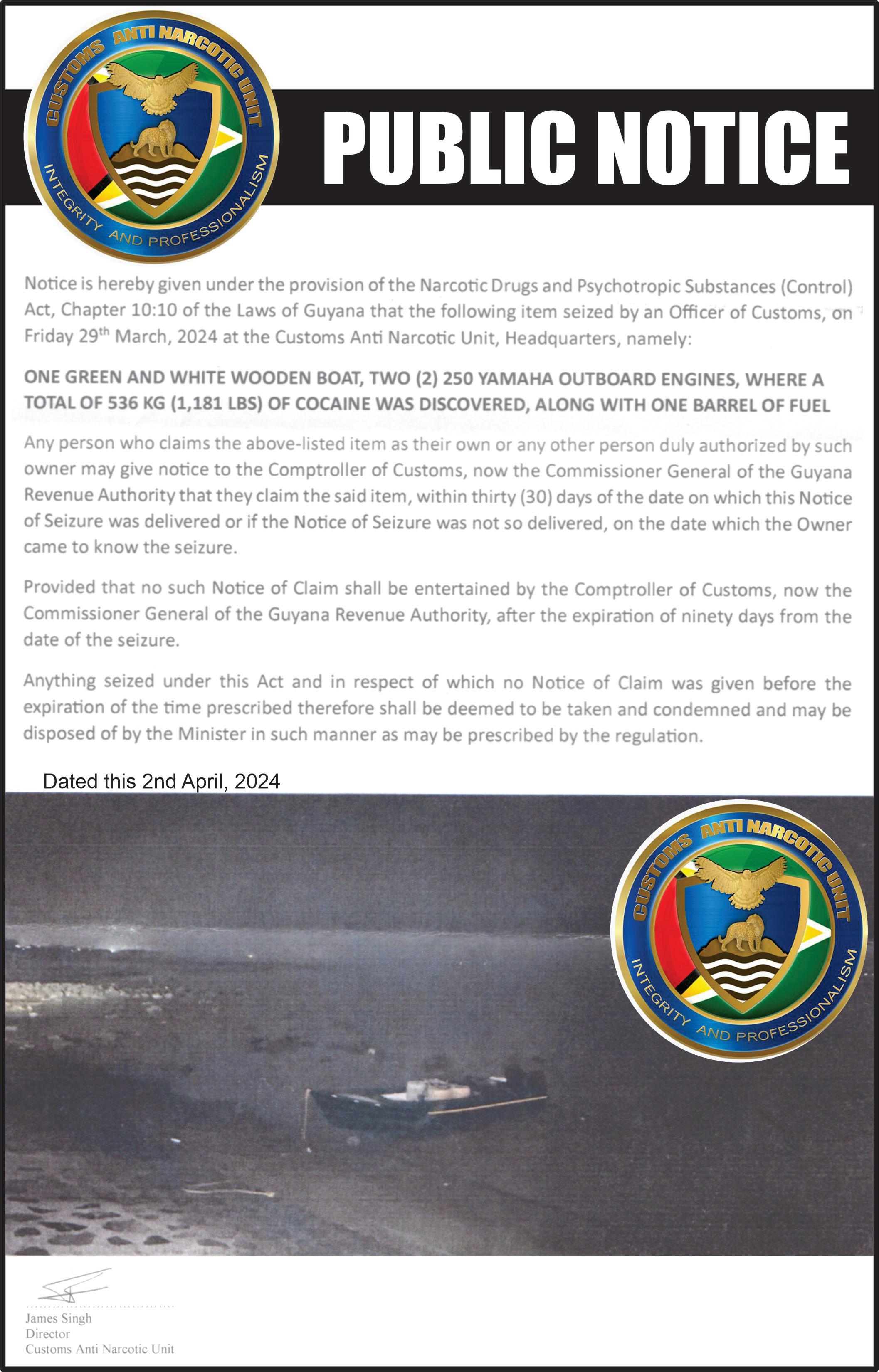186 Years of Rich Tradition
-Happy Arrival Day



-Happy Arrival Day


THE Ontario Medal for Good Citizenship is a provincial medal of merit awarded in the Canadian province of Ontario. It was established by the Government of Ontario in 1973 to recognise people who, through exceptional longterm efforts, have made outstanding contributions to the well-being of their communities and whose assistance is given without expectation of remuneration.
Among the recent awardees was Guyanese-born Canadian Narine Dat Sookram, who migrated to Canada almost 30 years ago. According to Narine, he aimed to build a career, but he pointed out, he built something else:a reputation for helping job seekers – particularly people of colour – find employment.
Sookram also built a safety net by offering his skills as a registered social worker psychotherapist – free of charge – to immigrants, refugees and international students facing mental health issues. He assisted newcomers with finding safe housing to alleviate the stress of looming homelessness.
On the theme of building, Sookram quipped, “I built something that was missing: a West Indian radio show to give my community a sense of home. That’s how Caribbean Spice Radio was born. Since then, my programme has captured both Canadian and international listeners. And it’s the only Caribbean radio show to win multiple CKMS Radio Waterloo Sonic Boom People’s Choice Awards.”
Moreover, Sookram’s Doctor of Social Work candidacy marks a significant milestone in his career, reinforcing his commitment to advancing his expertise and enhancing his capacity to serve the community. This educational achievement complements his extensive accolades, including the Global Public Peace Prize and multiple awards recognising his volunteer service and contributions to mental health and cultural diversity. Such recognition from various esteemed or-
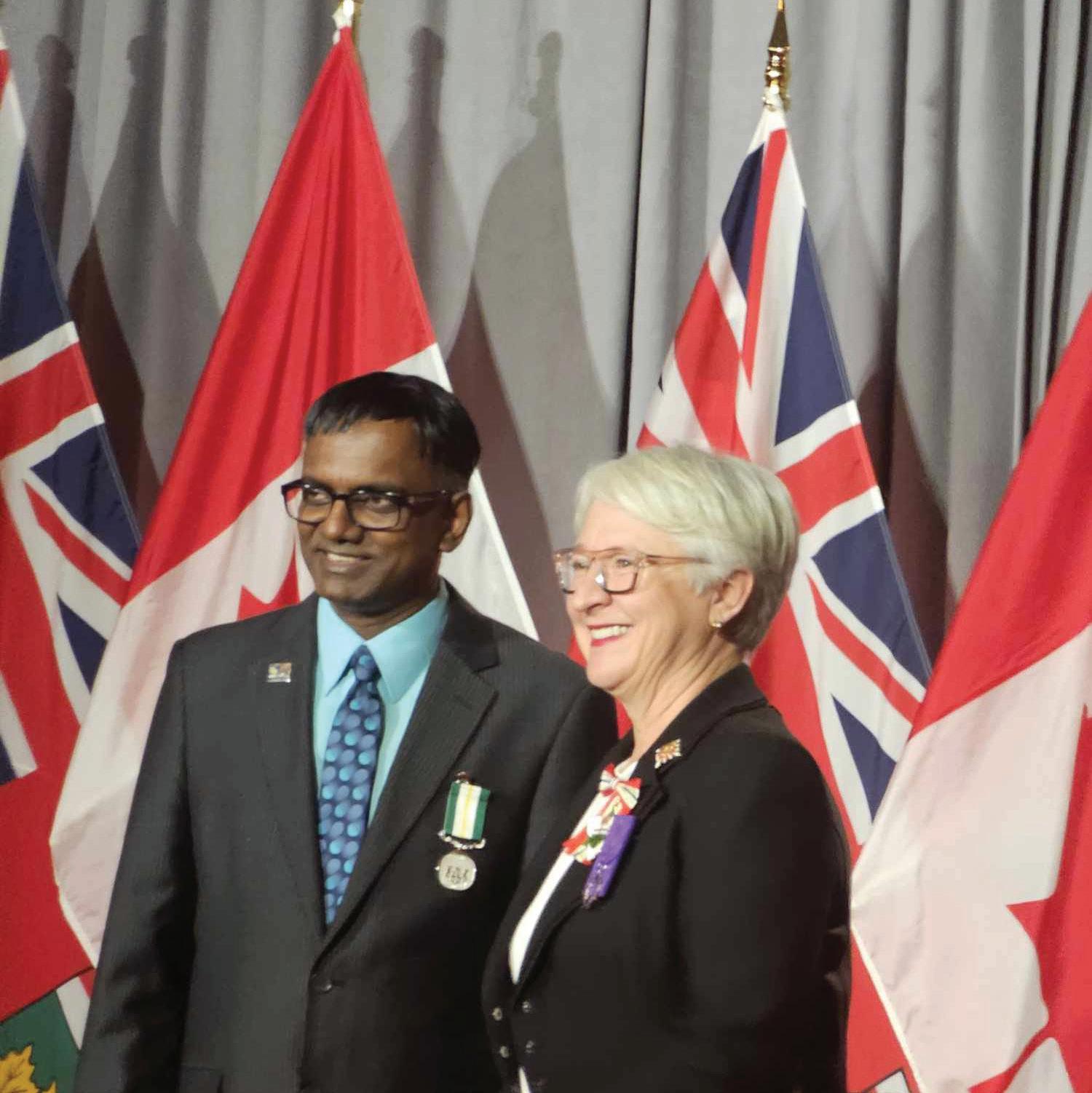
ganisations highlights his sustained excellence and dedication to social betterment.
Throughout his career, Sookram has excelled in his professional endeavours and substantially contributed to his community. His role in promoting mental health awareness and supporting addiction recovery has had a profound impact on

individuals and families, demonstrating his significant influence as a community leader. This impact is further evidenced by his receipt of the Waterloo Award, the city’s highest civic honour, which acknowledges his significant contributions to the betterment of the Waterloo region.
Sookram’s leadership extends beyond his immediate professional duties. He has been instrumental in fostering an inclusive community environment, evidenced by his recognition with awards such as the City of Pickering Cultural Diversity Civic Award and the Champion of Community Diversity Award. These honours reflect his exceptional ability to bridge cultural gaps and promote a harmonious community dynamic, essential qualities that underscore the importance of his work in social services.
The array of awards and honours Sookram has received over the years - over 200 - paints a picture of a highly respected, dedicated professional in his field. The OASW Distinguished Social Worker Award and the Governor General’s Caring Canadian Award are particularly notable, as they celebrate his significant contributions to social work and his exemplary service to the nation, respectively. These awards commend his past achievements and indicate his ongoing influence and leadership in the social work sector.
His proactive engagement with various organisations and initiatives further solidified Sookram’s professional standing. Sookram’s active participation in these groups enhances his professional network and en -

“MULTICULTURAL” is just one way of describing our beautiful nation. We are unique in our vast array of traditions that blend and work well together. Every cultural holiday becomes a Guyanese holiday as people of all races partake in the traditions of others, fostering the unity we are known for. Arrival Day is no different. Every year, on May 5, the country’s Indo-Guyanese celebrate the first of their people to come to Guyana. This year, the celebration will be as big as any other. Among the celebrations, dance and song, remembering one’s roots is the biggest priority.
Also a part of this year’s Arrival celebrations is Netu Lal. The talented 18-year-old has long been a champion for cultural togetherness. After winning Miss Teen India Guyana in 2023, Netu says that showcasing our tradition and culture is important to who we are as a people. After last year’s win, Netu has undertaken new ventures, including poetry, volunteering and acting. Moving forward, Netu hopes to achieve continued growth in her creative disciplines while championing everyone to display their culture as big and boldly as possible.
Netu is West Bank Demerara-raised and bred. Growing up in Coghlan Dam in Vreed En Hoop, Netu says she was a quiet child and very shy. Her personality was among the biggest reasons she did not venture into the arts, although she was passionate and creative. She shared, “I grew up in a middle-class family. The country life. I went to West Demerara Secondary School.
I was in the art stream, and I always grew up quiet and shy. People would always say that I should speak up and I can’t be on stage. And I wouldn’t perform well on stage, and stuff like that. So, I decided to take up theatre arts, and when I did my first performance, I realised that I had doubted myself as well. I realised that I really love public speaking.”
Netu’s first public speaking experience pushed her beyond boundaries she was unaware existed. She discovered her love for the stage before she developed her passion for modelling. She further explained, “I love being on stage, and really everything that society had said to me was just their perception of me. And I started to realise that it’s really when you face your fears that you gain success. So I went from being this shy, quiet girl to being somebody who loves

the stage and loves entertainment.”
The 2023 Miss Teen Guyana pageant was among Netu’s first major modelling experiences, and she excelled beyond expectations. The title is given to young women for a variety of talents. However, what stood

Guyanese Model, Poet and actress, Netu Lal
out to Netu was the display of culture. She was far more entranced by the exquisite traditional garb and what it all represented than by anything else. As she recounted her experience, “For me, what really captivated me was the fact that it was so into Indian culture, and that’s really close to me. I find that joining the pageant has improved me a lot. I learned a lot, and I was able to grow from being somebody who is more open-minded and ready to take on new opportunities and challenges and stuff like that.”
Netu has always had a deep appreciation for cultural diversity. Events like the Miss Teen India Guyana are just one of the many ways of showcasing tradition. Netu says that this form of expression is vital to all of us as Guyanese. “Showcasing your tradition and culture is really important. I mean, everybody’s diverse and I really like that we celebrate each other as well.” She further added, “We are not just by ourselves. We come together and we celebrate every event.” Poetry is also something that Netu is passionate about. She began writing several years ago as a way of expressing her emotions. After posting some of her work on social media, she soon gained traction, with countless people relating to
ever I’m shot, that’s when I usually write because I find that growing up it wasn’t really like a part of me to go sit with like a parent or somebody and just tell them what’s wrong. I always find myself getting distant whenever I get sad or angry or stuff like that.”
her words. “I started writing in 2020, and my poems, well, I usually find myself when-
Today, Netu is a part of many ventures. Acting, modelling, poetry, and volunteer work are at the forefront. She hopes to continue in her poetic career with aspirations of publishing a compilation of her work. “I would just distance myself, and it was hard for me to open up and talk to people. So the easiest way for me was by writing it down. So I started to embrace poetry, and I started to post certain poems, whether it was about relationships or family or home life or school and bullying and stuff like that. Moving forward, I want to publish a collection of my poems.” Although young, Netu shows what it means to be expressive. Whether culturally or creatively, it is important to always be proud of one’s identity.

‘Philanthropy doesn’t
One woman on a mission to help others by any means necessaryBy Shaniya Harding
PHILANTHROPY is often associated with the affluent, conjuring images of grand donations and high-profile charity balls. Onika Gentle is no stranger to tough times. She has had firsthand experience facing adversities. The 35-year-old had an interesting start to her roller coaster of a life. However, she has overcome countless challenges to become a successful profes -
With my brothers and my parents, we would go to the farm on weekends. When my father started logging, we would go with him. For us, it was fun. Because obviously, going in is just to play and whatever. You are [also] working. They might say, bring something. You run and go for it and come back and play.”
After finishing high school, Onika ventured out of her community to attend high school in Soesdyke.
cut short after the family member she was housed with migrated. As she explained, “My uncle decided that we could stay by him. And he ended up migrating. He ended up migrating. And my parents decided that I should go home. I used to go home every weekend. Well, when I’m there, it’s just like I’m home because we got to be home at a certain time. But it had all those restrictions. I returned home. I did not complete secondary school. I
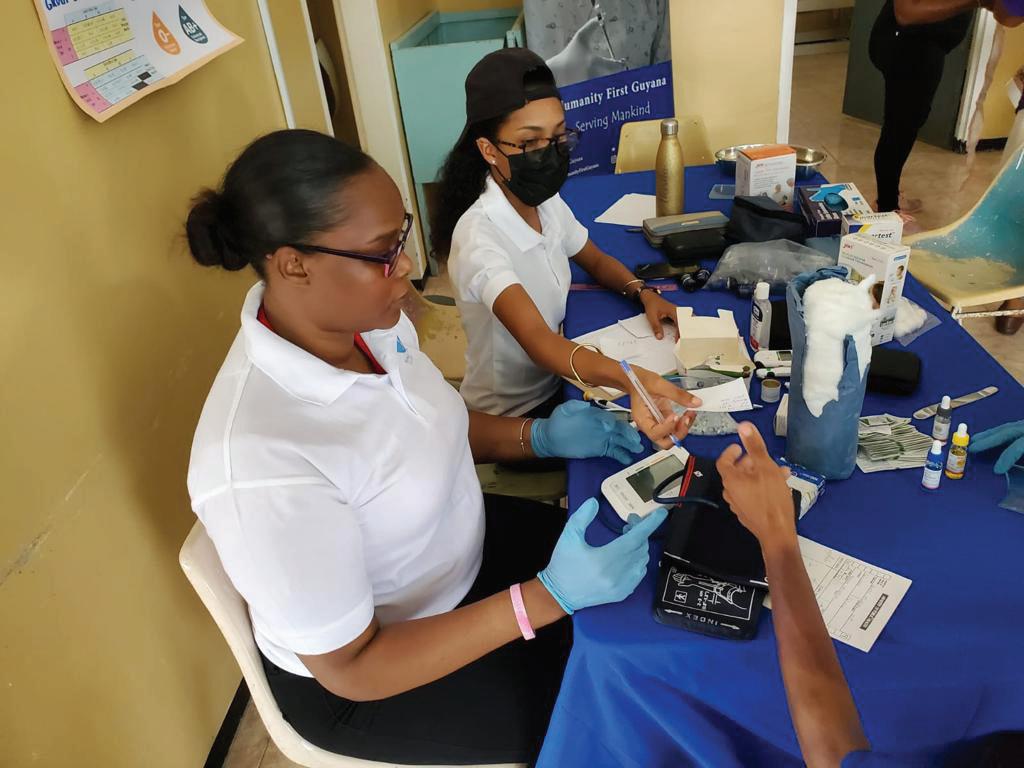
sional and blazing entrepreneur. Her story showcases the strength of the human spirit. Recently, she was nominated for Guyana’s Influential Women’s Award. Although appreciative and honoured, Onika aims to continue her humanitarian work. She champions the idea of change and the importance of helping others, even when you may need yourself.
Onika was born in the community of Low Wood. The small riverine community is located on the Bank of the Demerara River. Low Wood is a small, close-knit place, a community where logging was the major trade and everybody lived like family, and most people still do today. Onika describes her family as traditional. Her childhood was marked by days filled with following her father onto the backdams. As she shares “My childhood was mostly spent around my family, to be very honest.
This aspect of her school was challenging and was
returned home.” During this time, she went through a peri-
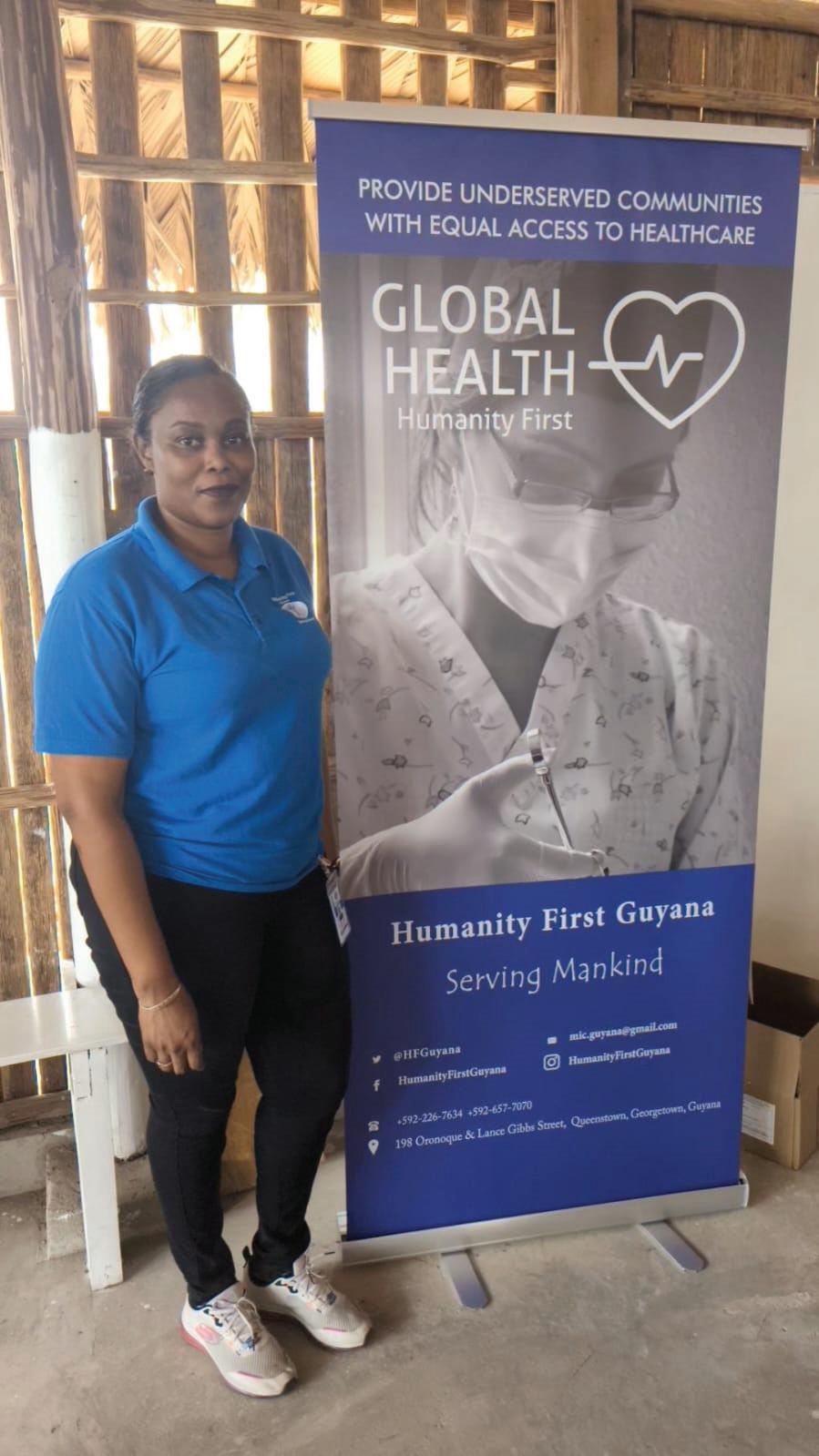
od of self-discovery. She left the village of Low Wood with newfound determination. Although she did not finish her secondary education the first
time around, she eventually got to complete it. After a few years of being home, married and divorced at the age of 20, she decided to turn her

life around. “I got married to somebody from the area that we knew. We pretty much grew up. He was overseas. We used to talk, pretty much like friends.”
Over the last few years, Onika has started major personal endeavours. Among her most recent accomplishments is working towards her Bachelor’s Degree in Business Management. She is also an entrepreneur. She recently launched her business, ‘Safe Movers’ along with a few other perosons. The growing business is one of Guyana’s few professional moving companies. She stated the tremendous progress she has made, saying that, “I’m the marketing coordinator acting at the Guyana Chronicle. I am the marketing and managing director of Safe Movers International. It’s a logistics company that caters to the housing sector. If you want to move from one apartment to another, we provide. It’s been officially registered for over a year.”
Onika shared that there was a point in her life when she knew she had to make some changes. Her choice to return to school was sparked by the fact that there was very little work happening in her community. “I wrote six subjects on two separate papers. I wrote four once, and then I wrote back. I went back because you see that there was not much happening in the area at that time as it relates to getting a job and all that. Well, it’s still now, but more so, CXC was like a degree. Compared to now, where CXC is just like a basic necessity,” she said.
Today, Onika is also the pioneer behind The Together We Transformer Foundation. It is a non-profit aimed at aiding underprivileged people with a focus on people. For Onika, her dedication and drive are attributed to one thing. She shared that, “Because I was in a place where I know what it’s like. Because I came from a place knowing what it’s like needing but not having.” Onika Gentle’s story is a testament to philanthropy transcending monetary contributions. It is about lending a hand, sharing resources, and fostering a spirit of generosity whenever possible.
HAVING the job he always dreamt of is very rewarding for Kevin Stoby, of Buxton, East Coast Demerara, a clinical pharmacist who birthed his own brand of homemade perfumes and colognes that can par with the high-end ones.
The 27-year-old told the Pepperpot Magazine that having a full-time job at the Georgetown Public Hospital Corporation (GPHC) while developing his own brand of fragrances was a bit challenging at first, but he has had some practice and he is getting better at it.
Stoby added that he has a pharmacy at his residence and also a room specially for his laboratory for making perfumes and cologne.
The idea of making his own fragrances came about when he was in the classroom at the University of Guyana (UG) during a session with one of his lecturers. She made a statement saying, “Of all the spices, cinnamon is one of the strongest, and it has a variety of uses.” This got him thinking of the possibilities.

and is working on developing 10 more.
He pointed out that he began making perfumes and colognes in 2019, even before he graduated from UG and currently, he is pursuing his Master’s in Public Health.
The small business owner added that he started mixing fragrances at home in his
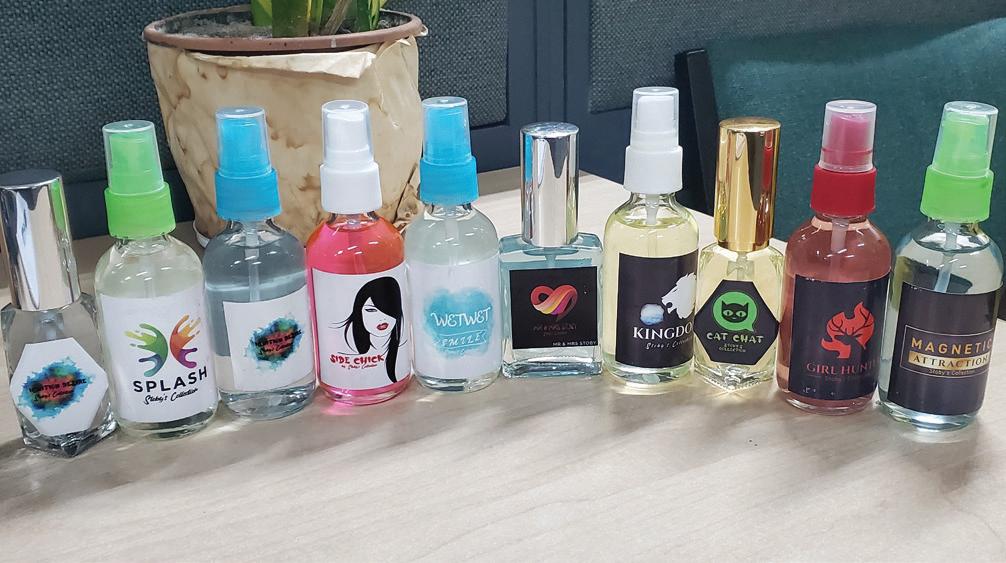
Coupled with his knowledge of clinical pharmacy and information from his classroom teaching of the course ‘organic/physical chemistry’, he began experimenting with the oil extracted from cinnamon.
“I was always intrigued with fragrances and scents and said to myself one day I will be able to create highend fragrances for the people, something local from scratch, and it happened,” he said.
Stoby, married with a daughter, related that the course on natural products facilitated by Mrs. Jewel Carter and Professor Raymond Jagassar really enlightened him about getting it right the first time he developed a fragrance.
Stoby reported that the knowledge imparted to him via classroom sessions enabled him to prosper in his small business, and today, he has 15 different fragrances
spare time using spices, and cinnamon, after he extracted the oil from it.
Stoby noted that his first signature scent is Mr. and Mrs. Stoby, a favourite of his wife, and the second is Magnetic Attraction, a really
Kevin Stobyhigh-scented fragrance that is both alluring and captivating.
The ingredients for his perfumes and colognes are all locally sourced and it’s from oils of 10 different spices, and seeds, including fruits such as watermelon, herbs and flowers.
Stoby revealed that one day, he will have a modern lab to make his fragrances and presently, he is looking for a place in the city for his store to sell his perfumes and colognes, which is priced from $3,000 to $15,000 depending on the bottle size which comes in three sizes.
One of his best-sellers is Heart scent, which always sells out fast since it is in high demand.
He makes his fragrances based on orders and he does the delivery himself He also has in stock in his pharmacy named ‘Quick Relief’ located at Brusch Dam, Buxton.
Stoby said that for the past seven years, his customer base has grown, and his colleagues at GPHC fully
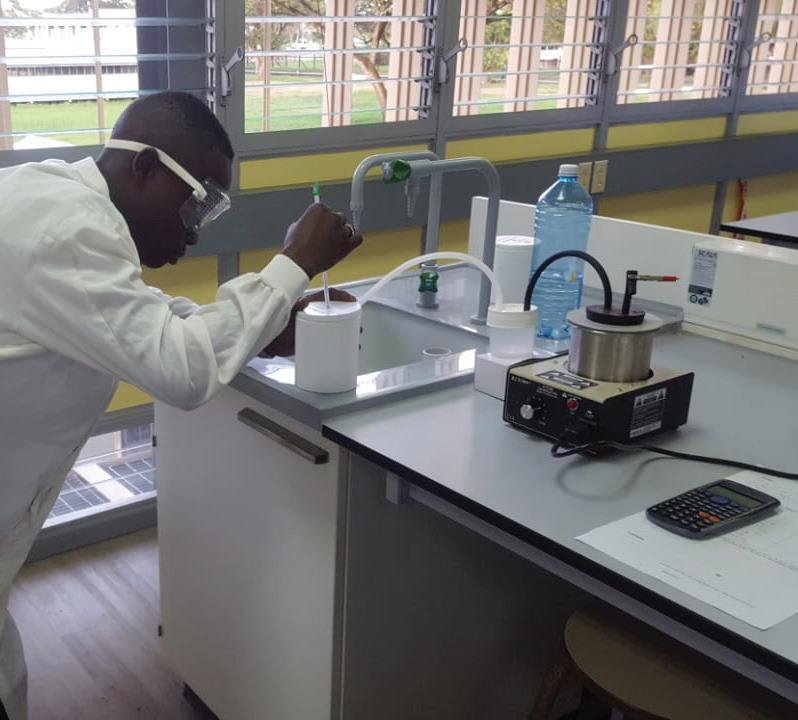
support his small business.
“If someone comes to me and says I like a certain fragrance such as One Million, I will replicate the same or close to it as possible in my own brand for that person and it is also affordable,” he said.
“I am working towards elevating myself. Career-wise I am aiming to become a clinical pharmacist who will be a part of the administration team at GPHC,” he said.
In that role, Stoby disclosed he could play a much greater role in promoting healthcare by developing ways to administer drugs to patients for optimum therapeutic effect.
He told the Pepperpot Magazine that he has been employed at GPHC since 2016 and he started out as a Pharmacy Assistant.
Stoby is a staunch Christian and is a part of the band at his place of worship, Reveal Word Christian Centre at 58 William Street, Kitty.
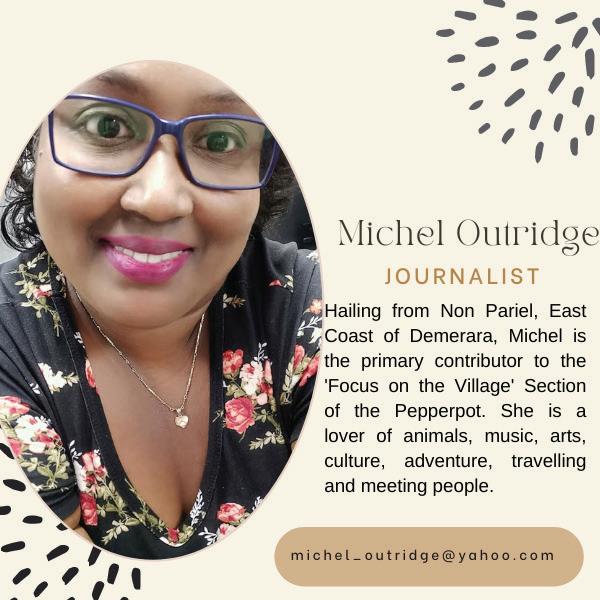
He revealed that his faith in God has kept him focused and humbled, and he is at a place in his life where he has always wanted to be satisfied with his achievements and is still aiming high.
Stoby stated that he is from a single-parent home of four siblings, but even though his father wasn’t in the picture, he supported them and from his boyhood days, he was moulded to make use of all opportunities.
He credited his success to God and his mother, who always encouraged him to remain focused and ground-
ed and work towards achieving his goals.
“My real joy and rewards come from serving people as a pharmacist. I would sit and talk to people for as long as it takes to assist them in choosing the right medication, to explain in detail what it will do for them to make them better and I like helping people in this way,” he said.
Stoby explained that growing up, he didn’t have it all and came from humble beginnings, thus his likeness to help people via his pharmacy and his job at the hospital.

JASMINE
Kiara RoweSamadhdin recently travelled from her home in Toronto, Canada, to visit Guyana for the first time to explore her Guyanese roots. Her first impression of the country is quite interesting, noting our rich culture, hospitality and people in oneness. Her father is Guyanese and is from Agricola, while her mother is of East Indian descent, a Jamaican who lived in England and then
relocated to Canada.
Jasmine is a singer, songwriter, filmmaker, and musician who comes from a musical family of three siblings. Her brothers play instruments, and her sister is also a singer who was on tour in Canada.
The 24-year-old told the Pepperpot Magazine that she sings soul, rhythm and blues (R&B) and had her first live performance in Guyana at Palm Court during their karaoke night.
Jasmine related that two
Fridays ago, she performed live during the Timehri Film Festival concert orchestrated by Romola Lucas at Fresh Café in the city, which started at 17:00hrs.
She is an R&B artiste from Toronto who showcases a soulful, technically trained voice and is carving out her unique path in the music industry.
“The thing that sets me apart from others is my distinctive songwriting style, which weaves beautiful melodies with raw, heartfelt


lyrics, drawing listeners into my world with each verse,” she said.
Jasmine’s talent hasn’t
gone unnoticed. She has collaborated with Grammy & Juno award-winning producers like Coop the Truth,

Txpski, and Neenyo, lending her pen and vocals in sessions for some heavy hitters in the industry in Canada.
Her time as a ‘Honey Jam alumni’ and a Remix Project Graduate (Round 18.0) speaks volumes about her commitment to her art and her desire to continually grow and evolve as an artiste.
Beyond the accolades and accomplishments lies a young artiste with a story to tell and a personality that shines through in everything she does.
Jasmine is a storyteller, a dreamer, and a true talent on the rise. With each independently released track, she’s amassed hundreds of thousands of streams, proving that her music resonates deeply with audiences around the world.
Her online statistics are as follows: 190K+ on Apple Music streams; Spotify Streams is 155k+; 2.8k+ on Instagram followers; and 30k+ on TikTok views.
The musician’s appearances on television shows like FUBAR (Netflix) and Reacher (Amazon Prime) have only further cemented her status as a rising star in both the music and entertainment spheres.
Jasmine’s visit to Guyana is to explore her roots, and she was encouraged by Dashawan Blackwood, 27, a Canadian who also has Guyanese parentage, a model, actor and businessman whom she met in the entertainment industry.
She was intrigued when she learned that they both had Guyanese roots, and every year, he would visit Guyana and talk about what a good time he had, and she wanted to experience that.
Over the years, Jasmine and Blackwood became good friends, and when she was invited to Guyana, she couldn’t wait to get there.
She has been in the country for a few days and already visited a few places and is hoping to go on the Essequibo River tour, among other
GUYANESE comedians
Lyndon ‘Jumbie’ Jones and Chris Gopaul, who have been making a name for themselves internationally, are still reeling in purely positive memories from their experience last week performing in Barbados at “Cocktails and Comedy – A world of laughs.”
Jumbie and Gopaul brought the house down when they joined with other comedians from Barbados, Trinidad, and Canada at the Lloyd Erskine Sandiford Centre last week Sunday; the Guyanese in attendance adored their performances no less than the foreigners from different parts, some of whom were perhaps hearing Creoles for the first time.
It all started when Chris was on vacation in Barbados last June and got in contact with ‘Rum and Coke’, a comedian duo who would do
small events around Barbados. Simon ‘Coke’ Alleyne invited him to participate in a show that he had at the time, and he was impressed by the performance. He called him recently to participate in last week’s show.
Gopaul could not have chosen better when he teamed up with Jumbie. Everyone knew Jumbie and shouted for him as they walked around promoting the
outstanding. They also were well-received at Flash Point, a Guyanese place where people

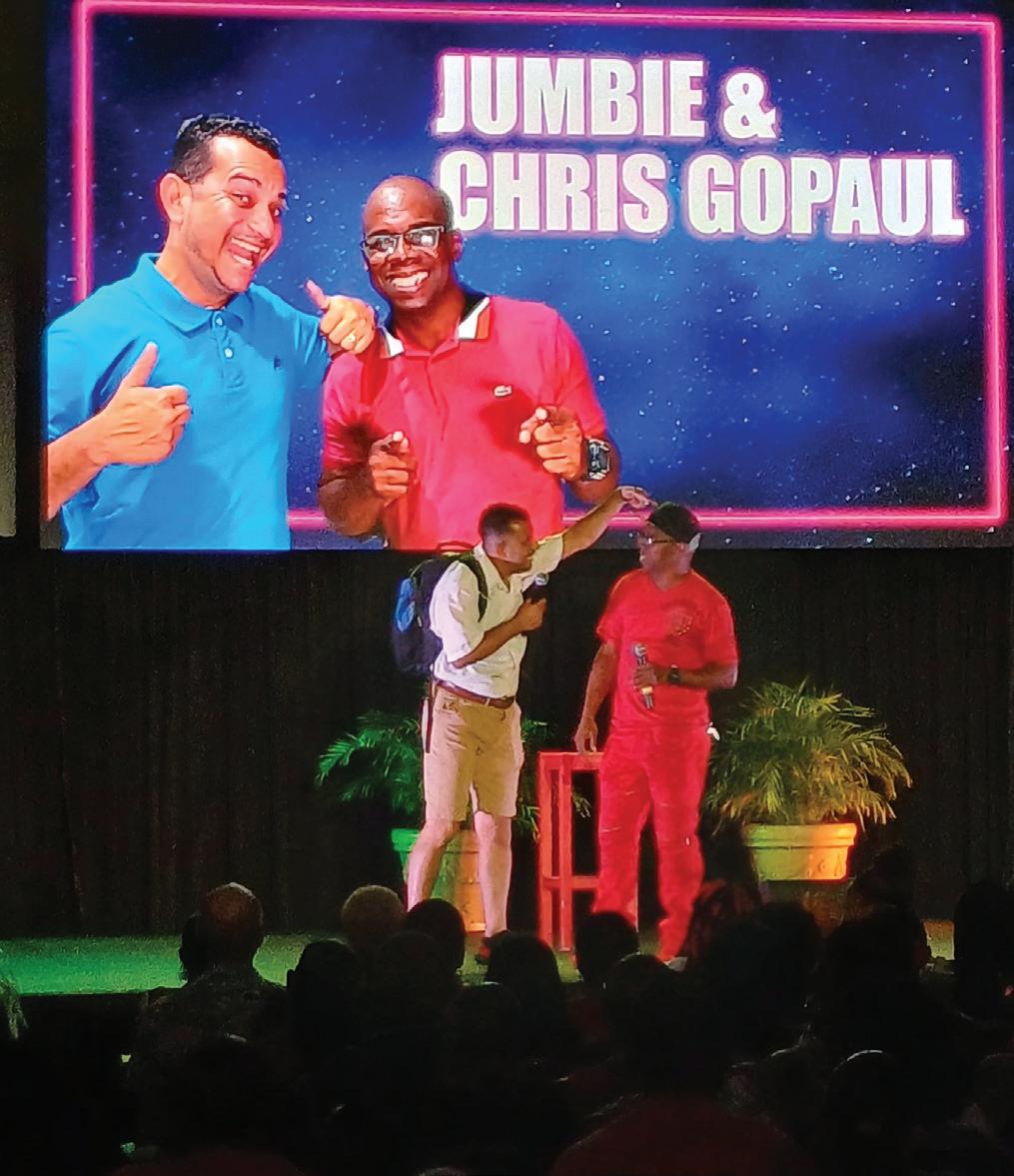
amount of Guyanese support. But once we touched that stage, that was it. Energy was high.”
Jumbie said the experience was enjoyable from beginning to end, thanks to the promoters who ensured that everything was in place.
He also enjoyed meeting and working with the other comedians and said they were a friendly bunch; instead of feeling he and Gopaul were on competition, they felt connected to the very friendly entertainers.
Not expecting a very large crowd, Jumbie was pleasantly surprised to see people there for the show two hours before it got underway. “They came out in their numbers. We had a large Guyanese crowd and what we did
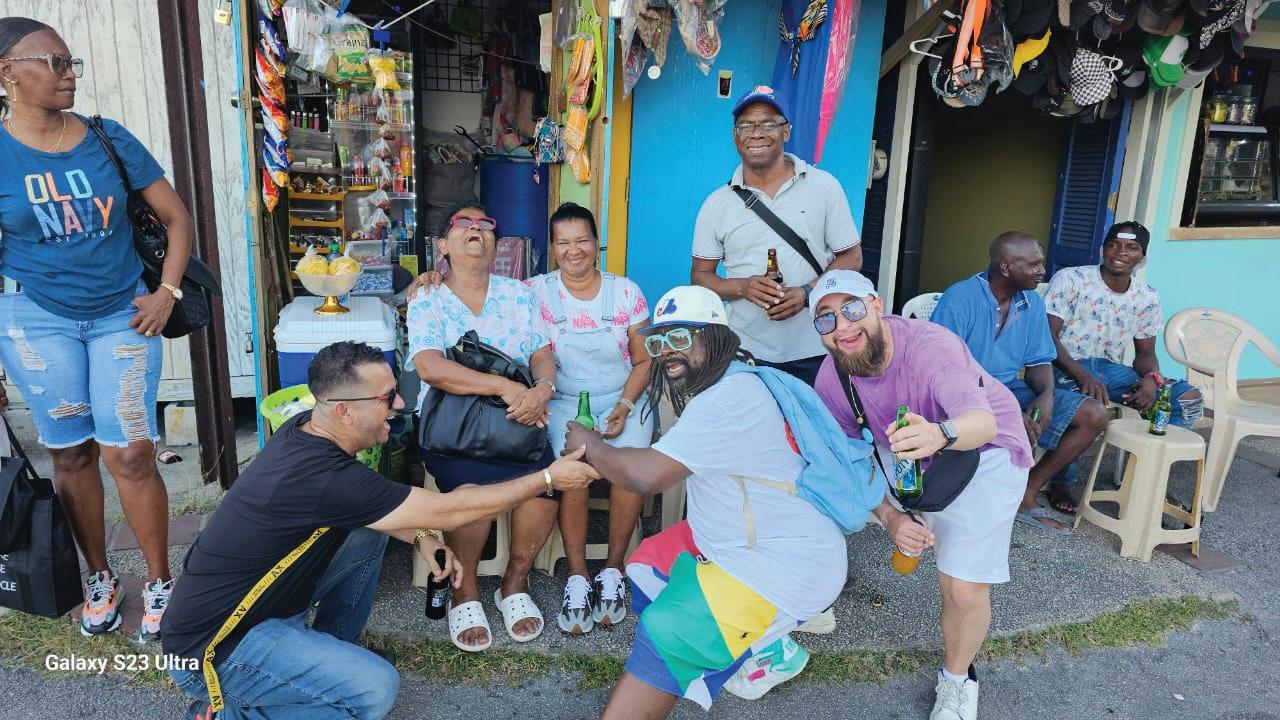
show. The reception the duo got when they went around the Barbados Bus Park and marketplace, where quite a number of Guyanese people can be found, was especially

party. The Guyanese entertainers also truly represented on the actual night of the show. “We brought the house down,” Gopaul told PepperpotMagazine and the promoters had to ensure they
was very well received. We had the audience going.”
“Chris went on and brought the house down literally(a part of the wall fell during his performance). He interacted with the audience
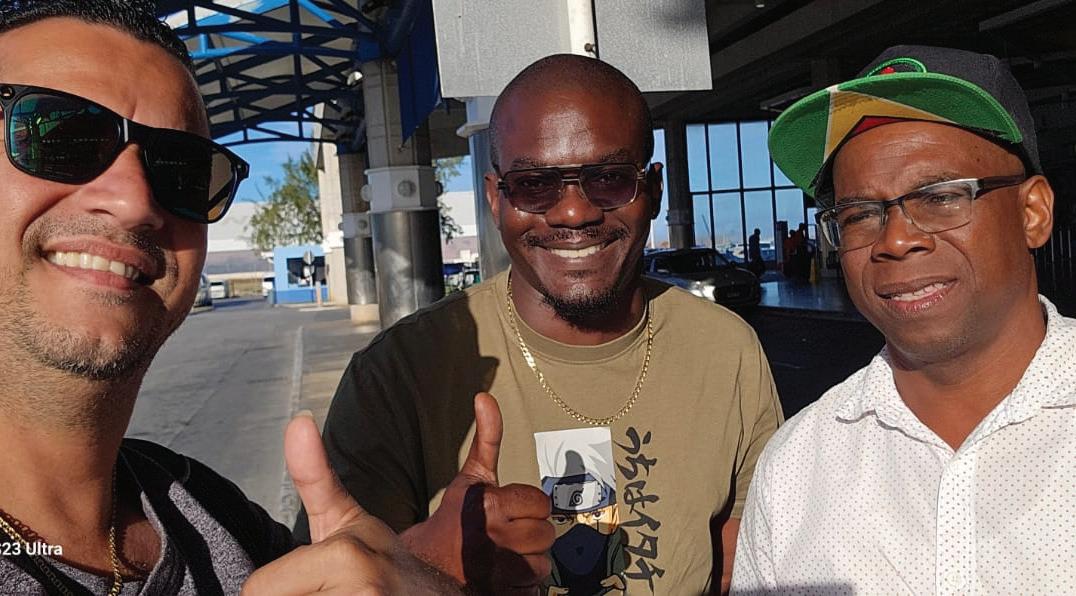
found more chairs for the people who kept pouring in.
“Jumbie is the one that set the mood. We were nervous because it was a lot of pressure on us because of the
and congratulate the team.
The love received by the duo in Barbados was nothing short “touching” Jumbie expressed. It’s nothing new to him, though, as everyone loves him, and he has been receiving such love over the years.
To him, once an entertainer is trying, they should be given some credit, even if they screw up. “We need to be commended and encouraged. Don’t attack us; we needencouragement. If we go out there and fail, the hater fails as well because we are representing all Guyanese.”
The ‘Nothing to Laugh About’(coming up in June) director cannot help but notice the progress being made when it comes to support from authorities but says there is still a far way to go with this. Even so, he doesn’t believe in constantly complaining. “I never like to look at that. We need to fend for ourselves like every other person doing any other job; we shouldn’t be complaining all the time.”
Gopaul shared similar sentiments but noted that just as other entertainers get help from the authorities, comedians also need it. “The singers get a lot of stage and credit; comedians need it too. Nothing against the singers; I want all of the artistes to progress because it is time for Guyana now. The rest of the Caribbean had it for the longest while. But Guyana has the talent, the people to do it, the know-how, and just how the ministry would help other sectors to progress, for people to see them and for people to shine, we need it too. And for the longest while, we have been doing it ourselves.”
and had them playing along with him,” Jumbie shared.
Not a single person left dissatisfied, and they all waited till the end of the show, even gathering to take photos
Even with limited help and resources, Gopaul said people the world over are loving Guyanese talent. “We are no longer local comedians; we are Guyanese, international comedians, because we have done this internationally and we are still shocking people with what we can do. Wherever we go, people enjoy it. The Caribbean people, they love what we do; we are a force to be reckoned with in the comedy arena.”
A RED sand trail leads off the road, tall trees tame the hot tropical sun, and various welcoming villagers greet visitors. Madewini Village, though among the smaller villages on the Linden Soesdyke highway, remains one of the most popular. It is neighboured by the famous Splashmins Resort. The village’s natural beauty and untouched serenity are well-known; people venture from far and wide to indulge in the community’s peacefulness.
However, to those who call it home, Madewini is more than pretty lakes and green trees; most of the community is comprised of closely-knit families. Over the years, villagers have forged strong bonds. Residents like Kizzy Lazarus, born and raised in Madewini, have travelled throughout the Caribbean. She described returning to Guyana as bit-
tersweet, with coming home and staying being a conscious decision. Kizzy returned to Madewini for the same reasons she returned to Guyana—not for the lakes or sandy beaches, but for family, friends, and the love of her home.
Venturing into the community of Madewini on any given day gives visitors a clear idea of what it means to call the village home. Most mornings, people venture to the nearby creek to wash clothes or to fetch water for the day’s chores. Kizzy, familiar with this way of life from childhood, described Madewini as her home, the place where her grandparents originated. She shared, “My grandfather is from up here. Because this is where he originated from.” Although the red sand of Madewini had always been her home, her earliest years involved mov-
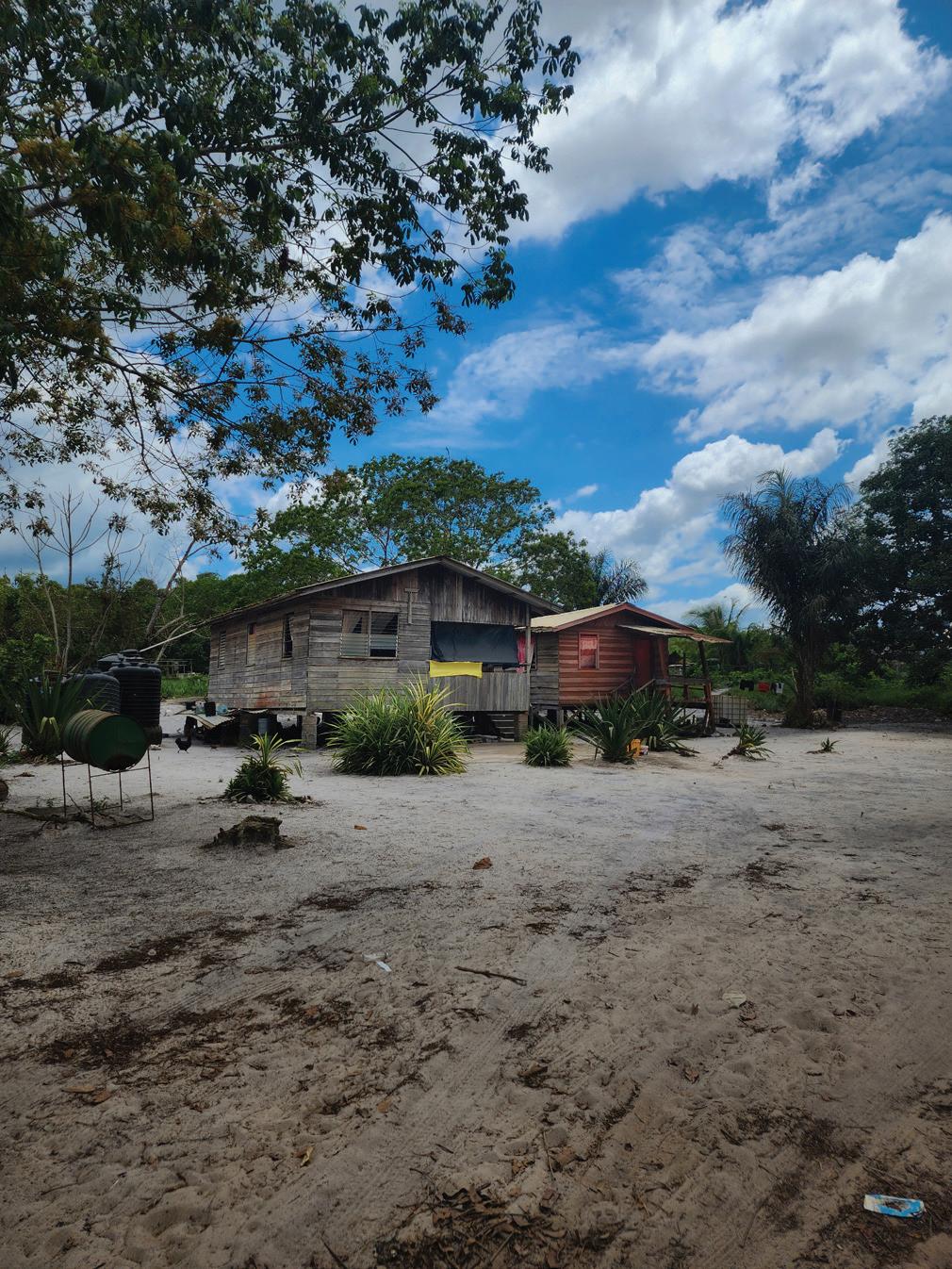
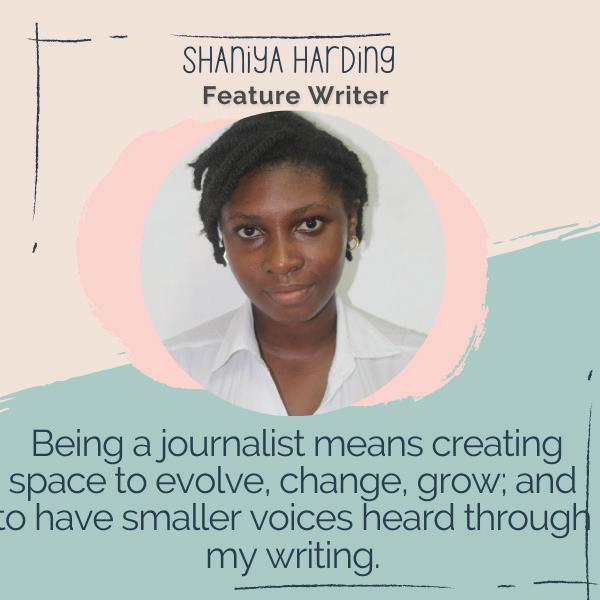

ing through various places, including the Demerara River. “For a small time, I grew up in Sandhill. There were a lot of boats around. My dad used to make these small boats for me, like rafts, to go out and swim and learn to paddle. That’s how we grew up,” she said. That period greatly impacted her and ultimately shaped her love for the serenity of Guyana. Her nomadic lifestyle continued into Kizzy’s schooling years. “I believe I was four or five years old when I finished nursery school and moved to the Timehri area. From there, I went to Temeri Primary. I lived with family members for a few years while my mom and dad travelled to Trinidad. So for seven years, I didn’t see them and lived with different people in the same East Bank area,” she shared. Her parents moved to Trinidad for betterment

when she was still in primary school, leaving her separated from them for several years. Although young, she understood their motives.“They moved to Trinidad to make more money and better themselves. But I couldn’t come with them at the moment because I was just going on a work trip, but the work turned into a couple of years as well,” she explained.
Life in Trinidad was drastically different from life in Guyana. From the people to the food, Kizzy said moving back was bittersweet, leaving a country she had known
as home for many years for a homeland she felt almost unfamiliar with. Returning nearly a decade later, Kizzy has since made a family of her own in Madewini. “I went to school here. I lived here when I was 13, went to school in Trinidad, came back from Trinidad at 19 plus, almost 20. Met my baby daddy and had two boys.”
Life is as quiet as it can be in Madewini. Kizzy says her days now are unlike those in Trinidad. Most days are spent tending to her home and family and enjoying the quietness of Madewini. She
described her day, saying, “You get up early, clean up, come down to the kitchen. If you had a pot of water, you’d put water in it. If you had laundry, you’d wash. Whenever you go back home, for me personally, when I go back home, I probably might go to my aunt’s place in front of the church out there. But at home, nothing is going on in the village. Everything is quiet. You gotta make things to do,” she explained. Throughout the years, Kizzy has had the unique experience of
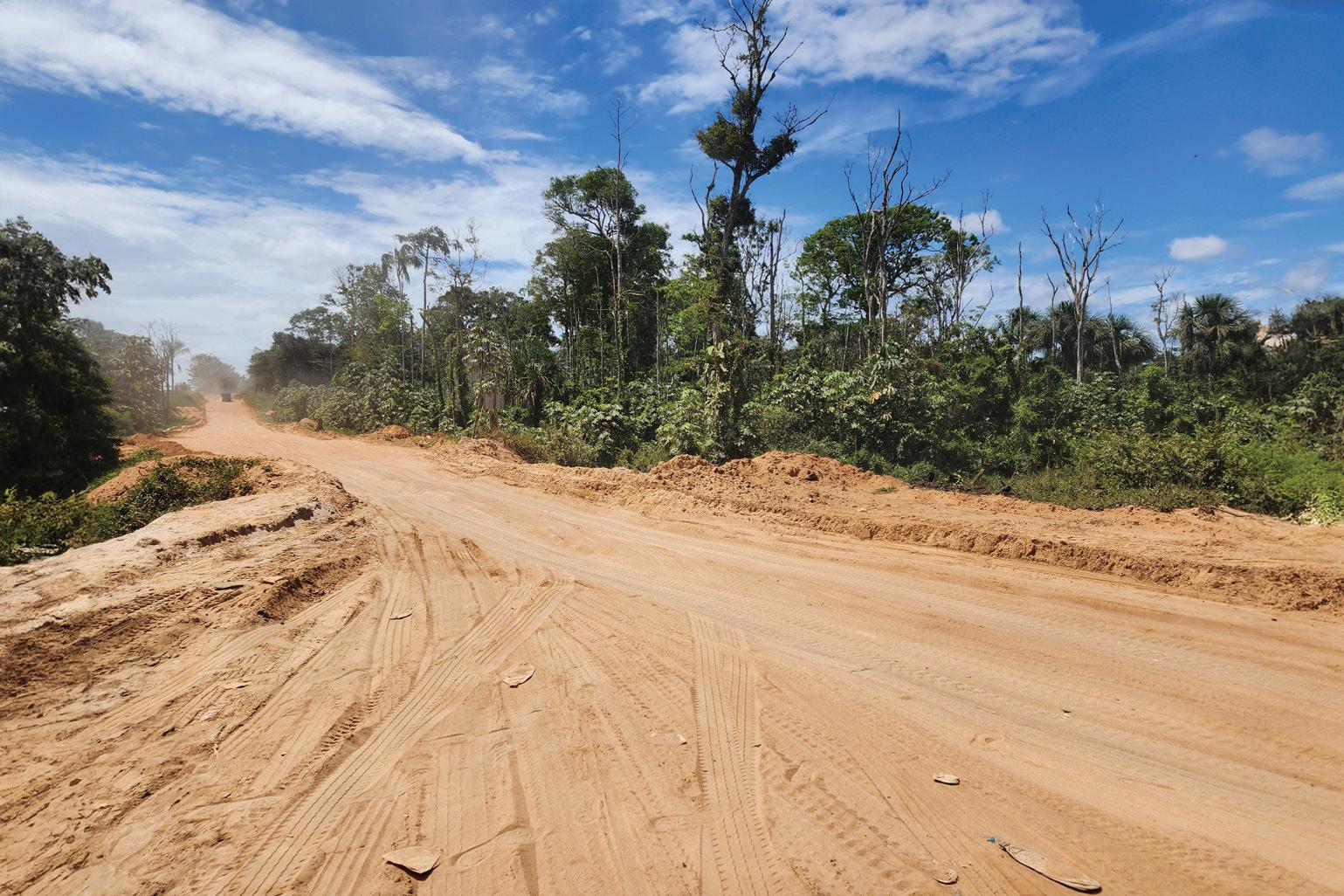
‘I
What it takes to make a living in the countrysideBy Shaniya Harding
FOR most of us living in and around the capital city of Georgetown, work is a simple matter. With countless companies and entities come countless opportunities. But life in villages like Madewini is a bit different. Agriculture was the only option for many years. There was not much in the way of businesses and work. In recent times, tourism has taken flight; five decades ago, however, jobs in the community were few and far between. Most people sought work outside of the village, leading many to leave Madewini and impacting its population. Kim Lam has known Madewini as home for as long as she has been alive. She enjoyed life in the community but struggled to leave it for work. So, she invented new ideas for work. From rearing livestock to charging phones, Kim has kept the entrepreneurial spirit alive and well in the community.
Going as far back as possible, Kim’s family has been a part of Madewini as much as the village has been a part of them. She is unsure about how her parents came to live in the village, but her childhood was filled with all the joys of life in the rural outskirts of Guyana. As she shared, “I don’t know how I really got to this place. All I know is that my parents lived here. They died, and we are here now.” Kim has continued the family name and has raised a family of her own in the village. As she shared, “Now my family lives here, me and my kids, I have four kids. Living in Madewini is very nice to me because you know you have big land and a quiet neighbourhood. My father and mother came up here when I was 10 years old. So, they brought us up, me and my brother, Kevin, here.”
According to Kim, her
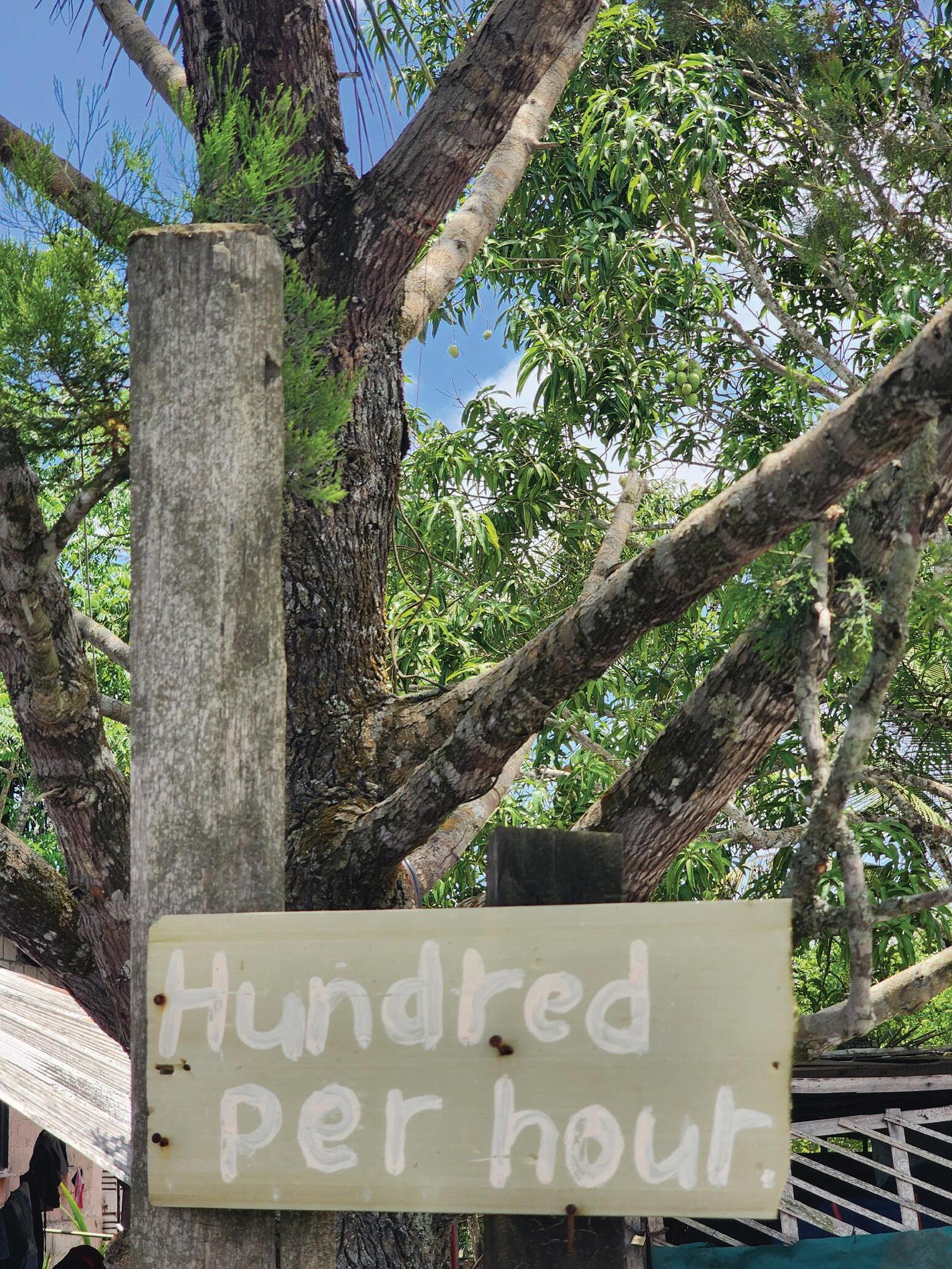
upbringing in the community was a good and unique experience. She explained that although her childhood was happy, filled with family and friends, it still had its challenges. More recent times make for a far more comfortable life. “Well, it wasn’t bad in a sense. Just transportation was very hard on the highway, but now it’s very much easier. I can see a lot of development now. Before, it was very, you know, lacking in this and lacking in that, but
it was always nice. Now we have got solar, we can charge our phones and water,” she explained. The community has seen development, according to Kim. With the introduction of more people, more small businesses have been emerging. “I would just pray that things continue as they are right now. And we get life for the people. Well, growing up here, we did not have jobs, so we had to go way out to get jobs, and it was pretty hard. And now,

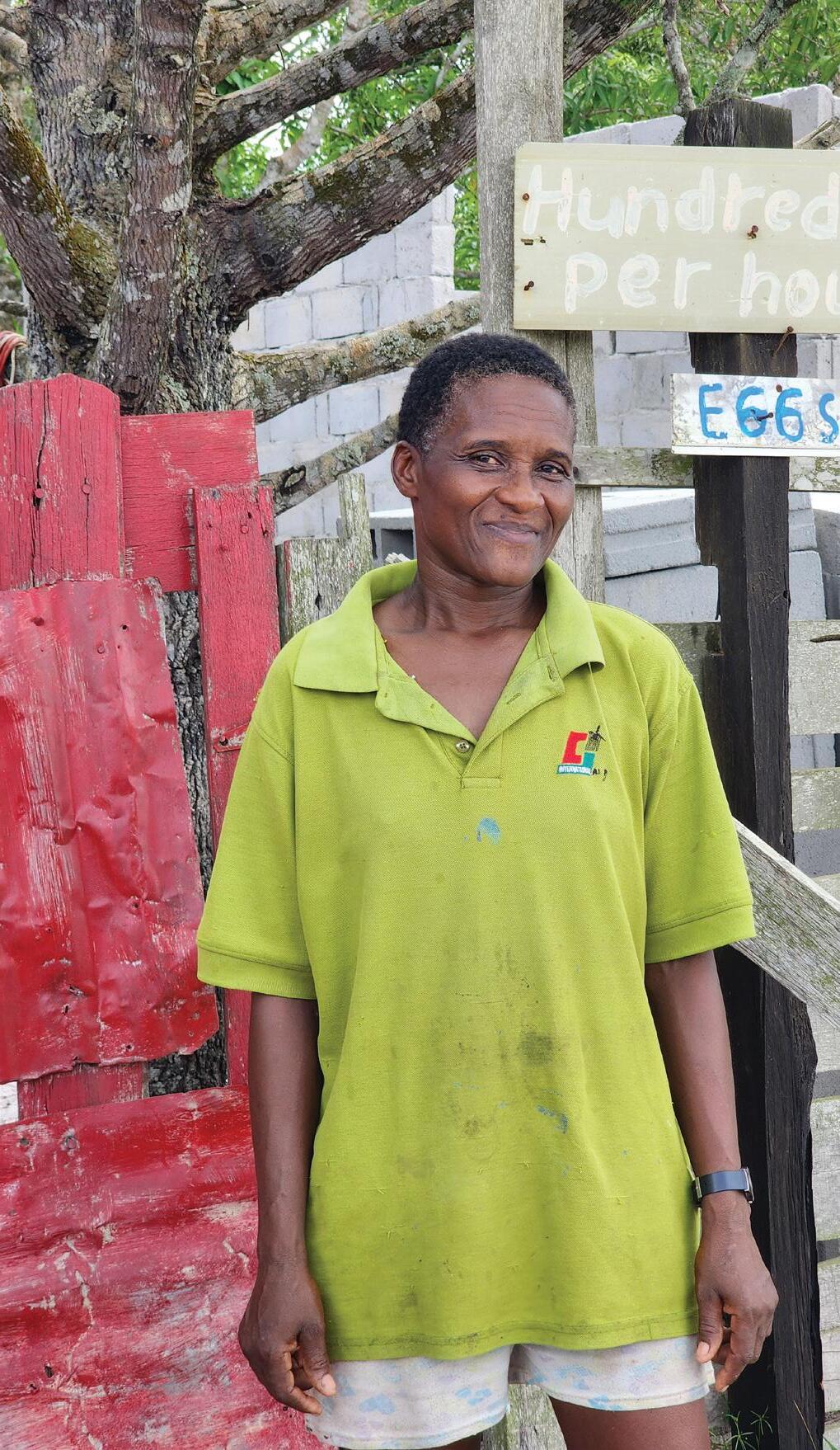
we’re getting jobs around here from big companies, so there is development all the time.”
Long before the introduction of big companies, Kim has been a go-getter. She began rearing chickens for a living. After the introduction of solar lights, Kim thought of a new economic venture. A large percentage of Madewini people do not have electricity, but the vast majority of them own cell phones. Kim saw this as an opportunity. She began a ‘charging business’. This unique idea has benefited both Kim and the community, especially those without electricity. She shared that she does anything to provide for her family. “I’m a farmer. I try to do a little planting and poultry. I raise chickens. I do anything, ac-
tually. I’m a hustler.” Being a hustler has brought her a long way. Today, Kim runs a successful agricultural operation. Her business has developed so much, that people venture into the community to support her business.
Kim says she owes her hustler spirit to her mother. Growing up, her mother worked hard and set an example for Kim, who still looks back on it today. As she explained, “Growing up with my mom, she was a seamstress. And she would always keep working day and night. So, I guess that is where I get it from. My mother would go out and bring food for us back in the day.” Most of Kim’s economic ventures have been agricultural, but the phone charging aspect is truly unique. She explained that, like most of the things she sets out to do, it began as a way to help others. “That’s like over 20 years I was pushing, and then the first time I
bought a solar panel, I decided to say, you know what, I can make some money.”
Over time, both the business and the community have grown. This has caused a shift in both the prominence of entrepreneurship and the support they receive. As Kim stated, “Well actually every other day if you don’t see someone every day, somebody would come every other day perhaps. Let me just put it down to that. It’s slow, but you still get something coming. You call yourself a hustler.”
Kim lives a quiet life amidst her many businesses. Most of her days are spent working her various jobs. Many people question her ability to manage as many things as she does. To them, Kim says that anything is possible, “I would tell persons that they can do just like me or even more because if they have the opportunity, they can go far.”
VILLAGES and communities are far older than people; change in a community can seem slow, taking place over many years. Maureen France has always known the community of Madewini as her home. She says the village has evolved over the years, with some changes for the better. Her life in the community has also taken many turns. From skipping countries
and changing families to surviving domestic abuse and life as a single mother, Maureen France embodies what it means to stand tall in the face of challenges.
Growing up in Madewini, Maureen was part of a big family. However, her many siblings and childhood trials would build her resilience. Madewini, some 50 years ago, was not much different from today. The village entertained quiet days and peaceful people. Most of the community’s
activities consisted of humble farming and family time. As Maureen explained, “Madewini was a very nice and quiet area. Way back, we would go out, do farming, do the gardening, cut wood to make copra, and attend Kuku Primary School. We used to walk three and a half miles to go there. Every day, morning and afternoon, we’d walk. We had our children with us.”
In her days, as Maureen puts it, their days began early, rising with the sun to


prepare themselves to venture by foot to school. “When you come home, you get as normal work to do. You go to sleep, and in the morning, you wake up at 3:30 to cook. You would go to school and then come back.” Today, Maureen’s family has spread out across Guyana and the world, with Maureen staying in Madewini. In the past, however, they were a close bunch. As she explained, “Growing up, I had six brothers. In those days, six girls, including myself. Currently, five girls, including myself, and five boys live alone. My brothers are hard-working boys.” Some years later, the true challenges of life hit the family when Maureen’s parents separated. She described that time as a difficult period that left her with many harsh memories. As she explained, “My mother and father separated. I lived with my stepmother. When I was growing up, she did not treat me well. My father never listened to me. They accused me of stealing, which I did not. I used to cry about it.”
Her challenges with family conflicts continued after she left school and well into her early teen years. Maureen explained that for many years, she was estranged from her father up until his death several years ago. She shared that, “I’m living with it because it upset me. I didn’t go through too many nice things because my father was a loving man, and then after my stepmother came, he just changed. But before he died, he asked for forgiveness. He told me he was sorry for what he did to us. I forgave him.”
Maureen’s schooling was cut short. After attending Dora Secondary for a few years, she eventually dropped out. She left home and lived in several areas around the country. As she shared, “After that, my stepmother put me out, I had to go to Sandhill. It was in the Demerara River. I stayed with my mother and stepfather, and I was dropping back in school, and I transferred to Covent Garden Secondary.” After leaving school, she ventured into the field of work where she worked with her mother
as a vendor. “I was very hasty. I’m a very hasty child. I dropped out of school. I told my mother I would help her because my mother was a seller in the market. She was a red lady, and they used to call her ‘red lady’. They did not really know her name.”
Starting a family is difficult for most young people for many reasons. Maureen’s young motherhood started off rough and was characterised by several unhealthy coping habits. She began drinking in the face of her husband’s physical abuse. She shared that her mother was there for her, and this was ultimately one of the reasons she gained the courage to leave the relationship after many years.
“Married to a guy, that I’m sorry I ever married because he took advantage of me. I was in domestic problems, drinking, partying, and my mother was there for me. She was trying to say, Maureen, don’t do that. Things are going to be better. But she was there for me, and I was still drinking and partying
SEE PAGE XXI

GUYANA has always been known for its athletic talents. From cricketers like Carl Hooper, Colin Craft, and Shivnarine Chandrapaul, to today’s athletes like Olympic swimmer, Aleka Persaud and the Baracara Boywonder, Shamar Joseph. Sports have always been a part of us; they run through our veins the way we run races. In her high school years, Sonya France was the embodiment of Guyanese sporting excellence. She
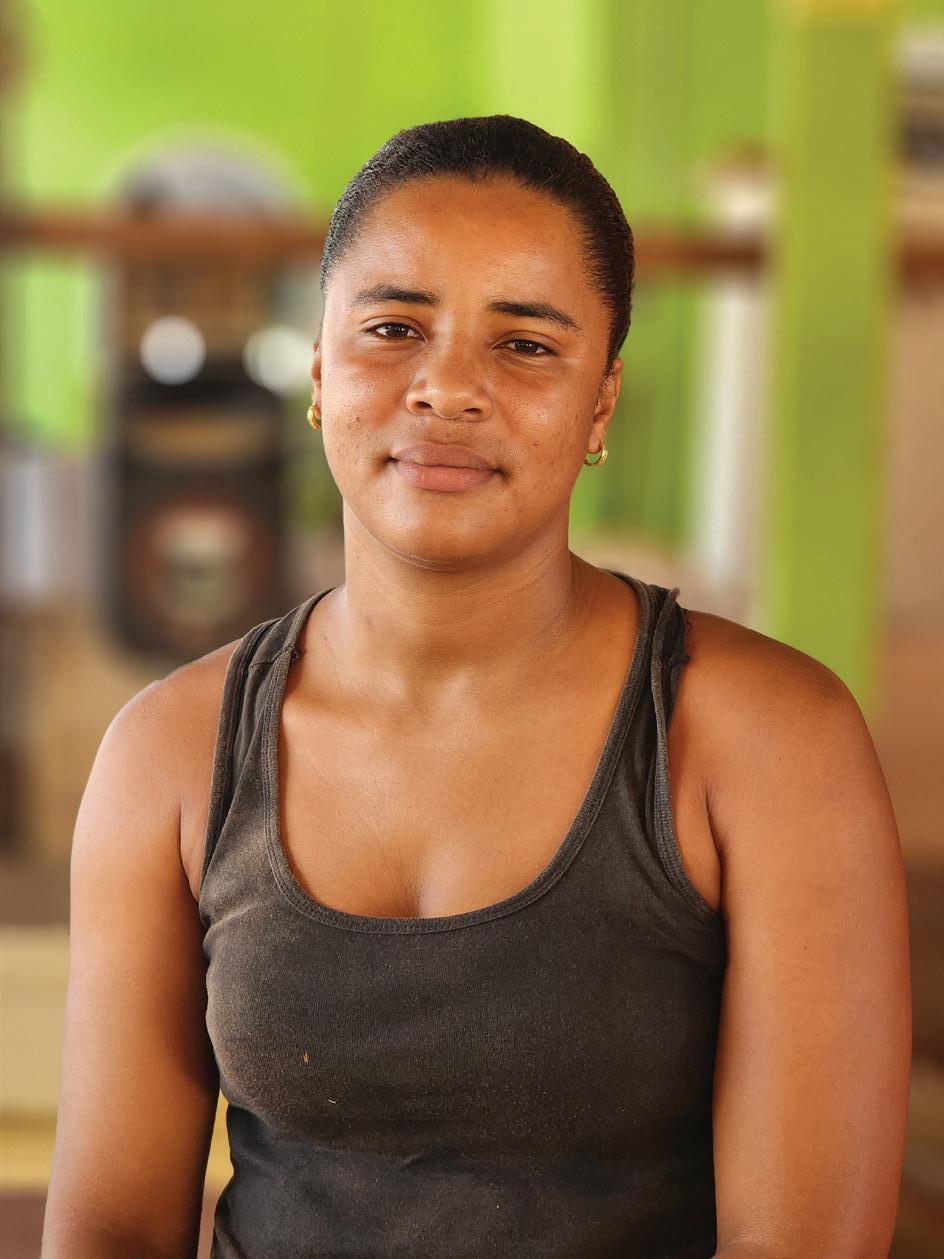
ran track better than most and was slated to become a phenomenal professional athlete. The only major difference in her sporting career was that she ran as a Guyanese in Trinidad. This did not stop her. Her sporting career ended due to injuries, and she returned to Guyana. Although she no longer runs like she used to, Sonya is still championing the support of Guyanese athletes in Madewini and throughout Guyana.
Madewini is one of many Guyanese places that showcase unity and natural diversity. Life in the community can be described as easy-going and simple. Most people say their day is made up of tending to farms and household chores, amid the beauty of the community. Sonya France says her days are no different; they are quiet days filled with serenity and family. She shared, “I’m a housewife. I am a mother of three. I enjoy dancing, singing, and mostly sports. If you don’t really see me sitting down, conversing with my uncles or with my cousins, I would be at home. Dancing, singing just me by myself.”
Born in Guyana but raised in Trinidad, Sonya’s Guyanese roots showcased themselves in her athletic prowess. She ran track and field for most of her high school years. She shared, “My favourite sport is track and field. I enjoy track and field. I succumbed to certain injuries, so I don’t really run anymore. I used to run over in Trinidad at St. Joseph’s College. But I don’t run anymore because of cer-

tain injuries.” Her athletic career was the only way to describe her experiences in Trinidad. Young and bursting with passion, Sonya soared to the top of track and field in Trinidad, but the lack of support was her biggest competitor. She shared, “My athletic career in Trinidad was very exciting. Because most of the time, when you’re winning, everybody loves a winner. That was me. My mother left me with my aunt over there. So, they would come and support me with lots of medals, lots of trophies. But due to me being Guyanese, it was a bit of a fight down over there. So, I faced a lot of setbacks on that part.”
As exhilarating as her short athletic career was, it was
enough to force a young Sonya to confront her cultural identity. She lived in a country she loved but sought to represent her homeland, Guyana. This was one of the biggest reasons she quit. As she explained, “They did not really want to put a Guyanese representative in front of their people. So, I just quit; that was one of the main reasons I quit. The support, I only got it from my aunt. And everybody else around wasn’t there. Because the majority of my elders were over here. So, you know, that kind of support to get a push to move forward wasn’t there for me. When asked about her biggest triumphs, Sonya said that running



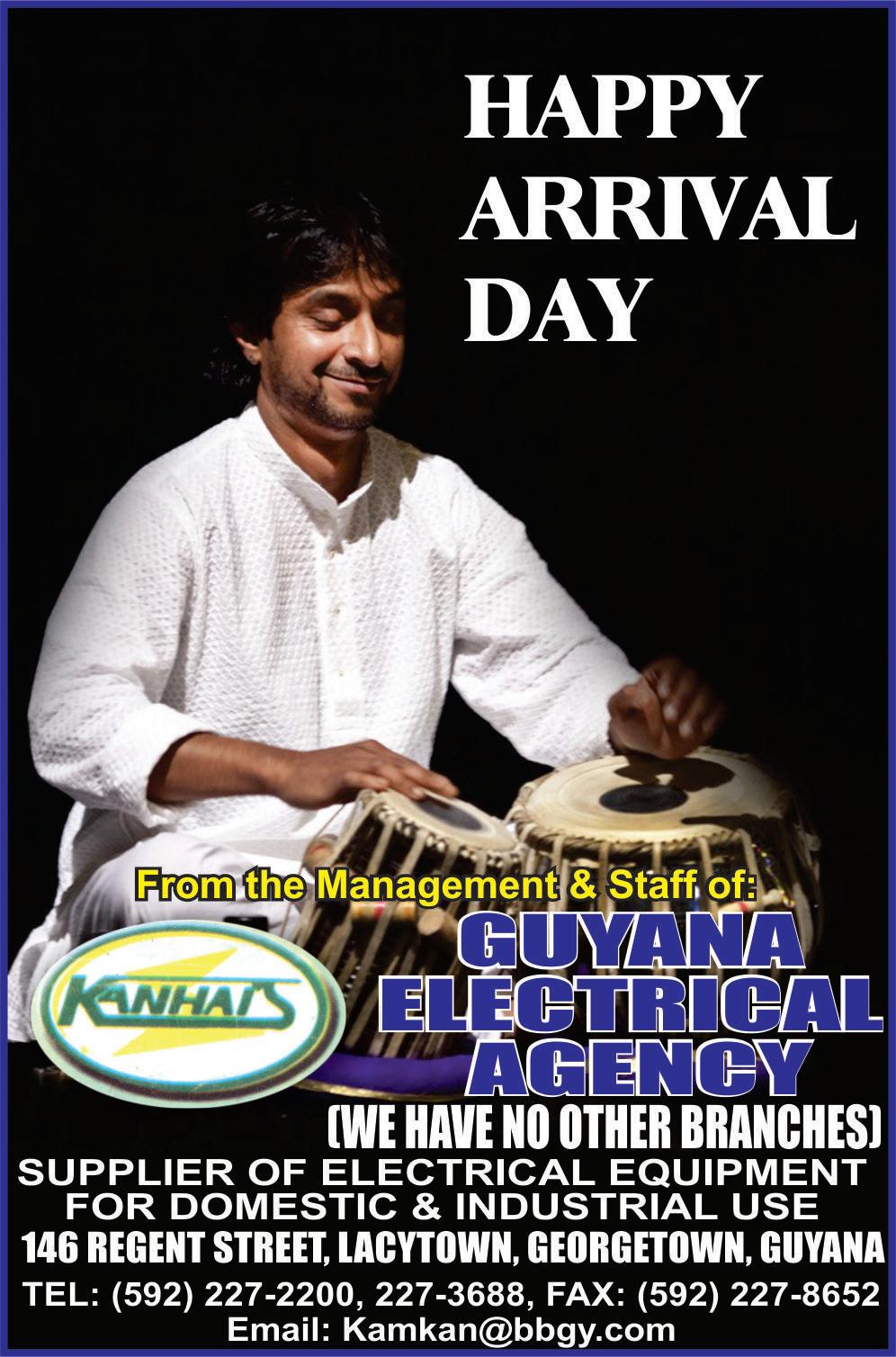
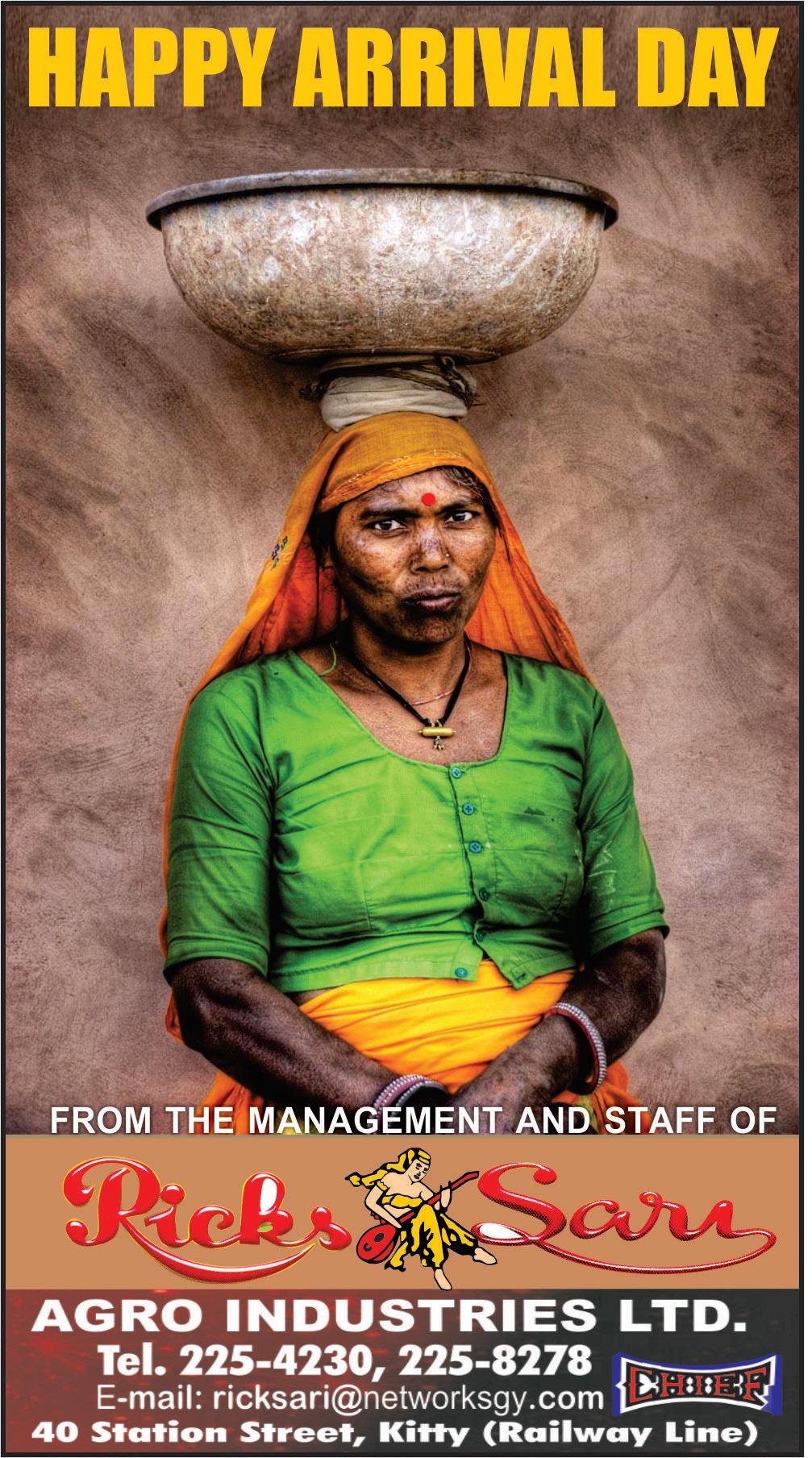



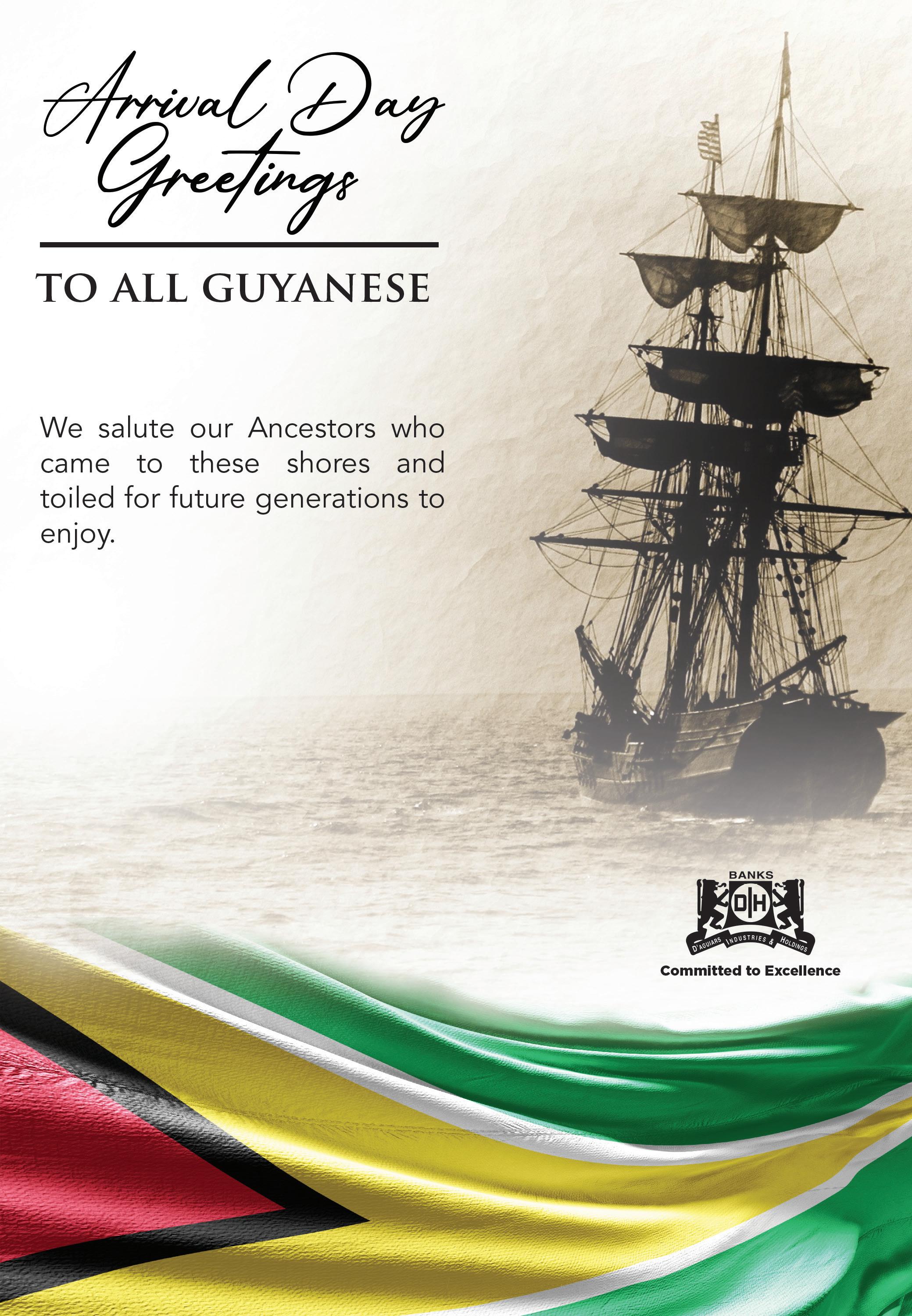
SARAH put down the Anne Rice novel she was reading and looked out the plane’s window.
The white, shifting clouds were not much of a view, and as she leaned back in her seat, she closed her eyes with a little sigh. In her mind, like a restless sea, anxiety rose and fell, for she was journeying to a place unknown, a place she had no memories of but a place her mother said had been home. An Asian ancestral home nestled in the South American continent, where aged old tradition and culture, like a fortress, history unmoved awaited the new generation.
Sarah toyed with the locket that hung around her neck, a locket that was a family heirloom her mother had presented
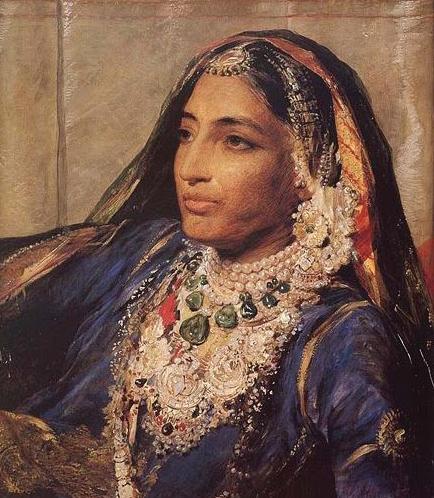
to her on her sixteenth birthday. The locket came down from generations, across the seas from Mother India to be worn by the firstborn daughter of the family. It was an honour she had to uphold from birth to death, for she is the light and the blessing. It was a legacy that was never meant to be broken but broke and shattered a family when Sarah’s grandmother left the traditional home and went away with a missionary’s son. Her betrayal left darkness and pain that, over the decades, stayed unchanged for only a daughter had to return home to relight the flame and resurrect the legacy. Sarah’s mother had not the desire to do so, for she found no interest in her ancestral family’s culture and the chain remained broken until Sarah came of age.
The intricacy and complexity of a culture she did not grow up in left Sarah lost, but from the moment the locket was passed on to her, she felt intrigued by its history. Inset was the picture of a Maharani, a woman of class and character whose life defined the true nature of Indian womanhood. In the depths of her hazel eyes Sarah saw the life and drama of a rich culture from the beginning.
The locket brought a change in her life that opened her eyes to a new world, and as the years went by, she felt a magnetic pull that drew her closer and closer to recognising her true identity. The dreams of a mansion and the estate grounds, portraits of an old family, beautiful ceremonies, mesmerising dances and six numbers
in a small room were like scripts of a new life. The Maharani was calling her home. A daughter had to return.
The air hostess’ voice over the intercom jolted her out of her deep thoughts as the plane started its descent to land. She was home!
The turbulent waves of anxiety that had been crashing all over her mind became calm as she stepped out into the warm sunshine and her feet touched the land. A sensation like a blooming flower, its blossoms, its petals, filled her mind and tears, the jewel of emotions, wet her cheeks. The long drive to the country estate was a journey, in her mind’s eye, that she would cherish forever, a beautiful and green land. The fresh air, the fresh fruits by the roadside and smiling brown skin people, like butterflies in paradise, made her wonder if it was one of those dreams that took her back in time but when the car swung into a gravel roadway bordered by thick, green vegetation and stopped by a huge wrought-iron gate, she knew it was real.
Sarah took a deep breath and stepped out before the car drove through the gates and stared at the mansion. It stood there, dark and lonely, in the quiet estate land, where shadows like unlit lanterns seemed to hang everywhere – a legacy unblood by betrayal, to bring to life again. The old gardener at the gate looked at her, surprised more than his age. In a low voice, broken by time, he said, “Missus?”
She smiled warmly and nodded her head, acknowledging his recognition. He clasped his hands and bowed his head.
“Is been ah long wait.” He said in creole, “Finally, ah daughta ‘as return.”
She walked along the pathway to the mansion, in the footprints of those who had walked there throughout the decades, up the worn winding stairway. A sense of belonging, deep as the seas, the dynasty of this family, flowed through her heart and so overwhelmed was she, the precious tears flowed. The teak door opened, and the two servants were no less surprised than the gardener.
“Missus?”

She nodded and they broke into tears.
“Yuh look suh much like she.”
The portrait on the wall of her great-grandmother spoke more than words could, from the golden old to the modern, sacred family ties.
Sarah slept that night in her grandmother’s room, tired after her long journey, so she was unaware of the silent figures that stood at her bedside, looking at her beautiful sleeping face. Their young princess had come home. So long they had to wait, and now they could leave on the waiting chariot to God’s Kingdom.
The morning dawned, the miracle of a new day in the house and the grounds, where there was light and cheeriness. The cook was humming an old tune, the maid brought in fresh flowers from the garden, the dull antique furnishings were gleaming and even the portraits on the wall seemed to have a smile on their faces. Sarah stepped out on the balcony and raised her hand as the gardener shouted a greeting. She breathed deeply, the fresh scented air of jasmine and magnolia as she looked across the sprawling lawns. The family cemetery lay in the shade of huge flambouyant trees, the dynasty from across the seas, her inheritance, her legacy. She stood at the vault where laid the Maharani, Queen of the family and she said, “It’s good to be home, I will continue our tradition, keeping the legacy alive, that was broken. You can now rest in peace.”
That night, she sat in the private sitting room reading one
of the old texts when she saw scrawled over one of the pages, the six-digit number she had been seeing in her dreams. She walked over to her great-grandmother’s portrait and said, “Is there something more, I need to know?”
The deep look in the hazel eyes shined always like she wanted to say something and as Sarah stared at it she saw something like a glint beyond the eyes in the portrait. Sarah stood on a chair and peered closer.
There was something behind the portrait. She passed her hands slowly, but found nothing that could automatically move the heavy portrait. She stood there puzzled for a little while and lifting the locket that was around her neck she said to the Maharani,
“I don’t know what you’re trying to tell me.”
At that moment, something opened with a click and the portrait slide aside, exposing a secret door, with the numbers written on it. Sarah looked at the locket, amazed.
It was the magical key.
She opened the door and stepped into a room where the Queen’s jewels were stored in glass cubicles on the wall, an astounding collection of the most precious jewels she had ever seen. One small box stood on a round glass table in the middle of the room. Sarah opened the box gingerly, and resting on silk cushions was a note with the words, “For my daughter on her wedding day.”
Tears filled Sarah’s eyes, for she understood more than ever now how deep was the pain her grandmother’s betrayal had caused the family. She smiled through her tears and closed the door, a secret to keep a family secret. Only when her time was ready to wear those jewels would she reopen the door. That day her great-grandmother’s desire would be fulfilled and the legacy of the Maharani will continue from generation to generation.
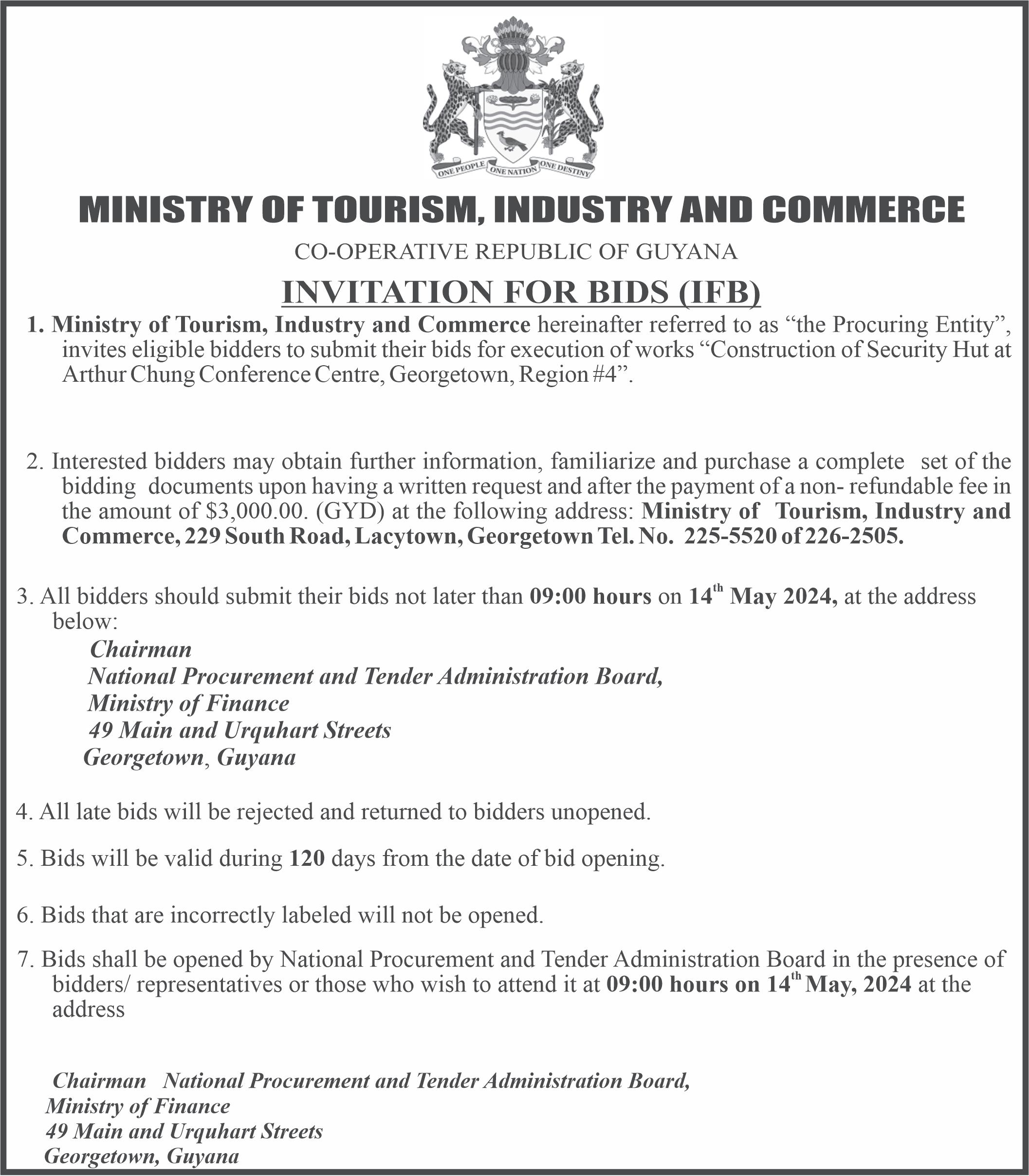


I WAS engaged recently to discuss the nature of the masthead of this column, ‘Talking Culture’, and out of that Bourda discussion, I learned a lot of things that I already knew but did not contextualise. Most of what I have learnt about defining the nature of this realm we call culture was taught to me by Dr. Denis Williams and his visiting cohorts at the Walter Roth Museum, which he created and developed, where I was trained as a Scientific Illustrator. I was never certified, because I was to be sent to Scotland to be trained in animation but the then-Minister determined that I would not come back.
I was enraged. Dr. Williams joked with me that I would still be close to ‘my Pepsi Cola’ as he described my young lady friend working across the road, then at a much more capable GEC. We are still together today. I left the museum, guided by my youthful cultural rage, but until the time of his passing, we remained close. He was always an elder brother to me. I was calm and mature when he explained the profound reality of that training: “Guyana would have still lost you, because, on your
return, how would we have accommodated you? There was no animation platform in existence, so you would have had to return to foreign shores to express yourself and earn.” But one of the other things I had learnt that is of importance to this column is the varied nature of culture.
On the East Coast, there lived two - what we callspinsters; they were sisters. They lived in a moderate home; aback of this home, there was an obviously poor family. Somewhere along their communication, the male would be employed to do menial jobs for the sisters. It was interpreted that upon the passing of the spinsters, their property would be left for this ‘poor family’. Subsequently, the spinsters suddenly died, the police were called in, and confessions were made: They had been murdered. What could have transpired to have resulted in this sinister occurrence? Even if there was such a hint of possible inheritance, what could have led to such an act? The entire process of cultural communication was in error, if it did occur. It played on anxieties to which the cultural tenets did not exist, to project the possibility of the promise into a possible fu-
ture reality, and not to hasten its fulfilment by any means necessary.
Most peoples who have been colonised, to their detriment, were progressive and self-contained, and were culturally mature and accommodating, interpreting the other by their own rules of reasonable engagement; a severe misconception. What we must understand about culture is the fact that there is accommodation without acceptance, and that ‘deception itself’ is a cultural trait that is applied at different levels to test the intent of the other, or to lure prey as a hunter would. Thus, other cultures must be explored, including what is sacred, what is common, and what is the innate imagery of the ‘Timeline’.
The foundation of culture is its art, music, philosophy, mystique, and literature. Each person, however, has a localised culture that he/ she exists with that sustains circumstances of survival by whatever needs are required, if not related to elder teachings that have developed by the scars of experience, be they right or misguided. That is why children and young adults must be tutored towards positive core values; be able to use comparisons

under peer pressure, and know when to be courteous and when to move on. Thus, the being of Culture. Many things, including true financial shortcuts, that seem comfortably enterprising may not be as simple and workable without succumbing to legal life-changing risks. Culture is not just visible celebrations. To a trained awareness, they constitute invisible realms that can be discerned, suspecting with caution, the other not-so-visible creature that rests and whispers on the other’s shoulder.
De lamentables
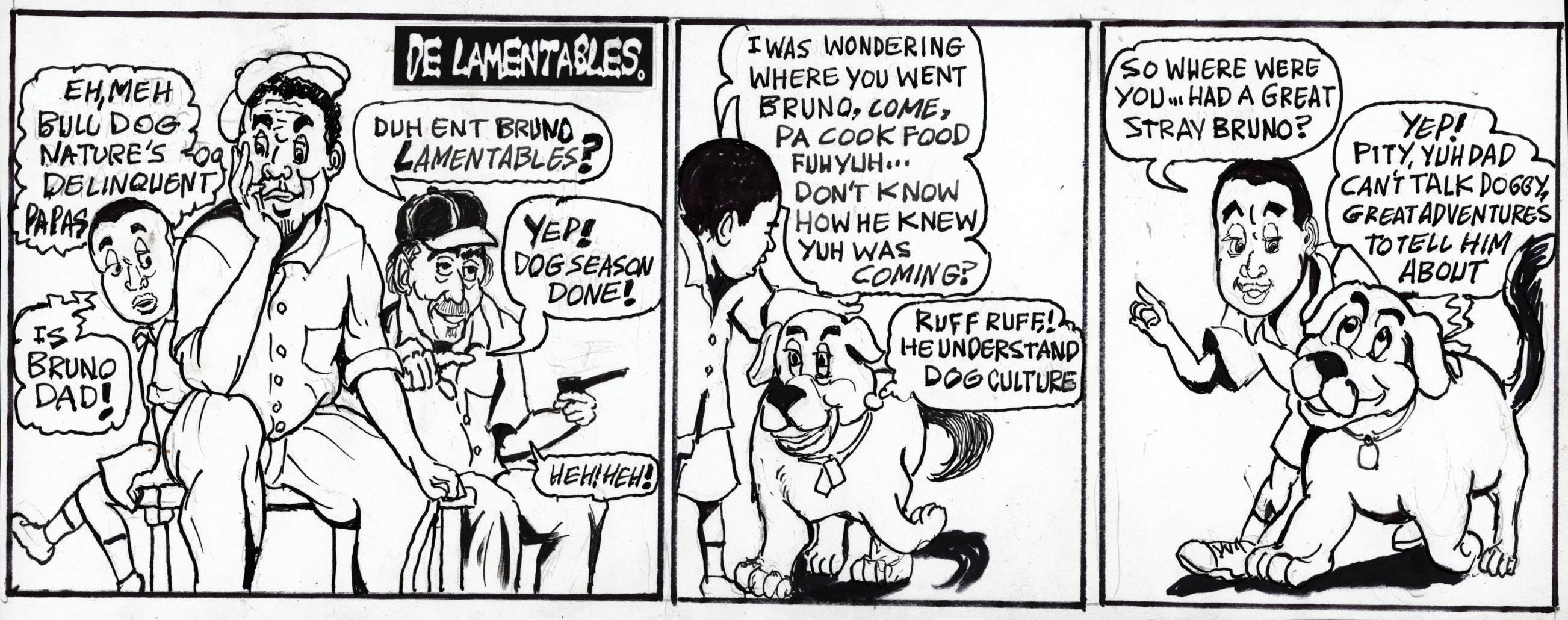
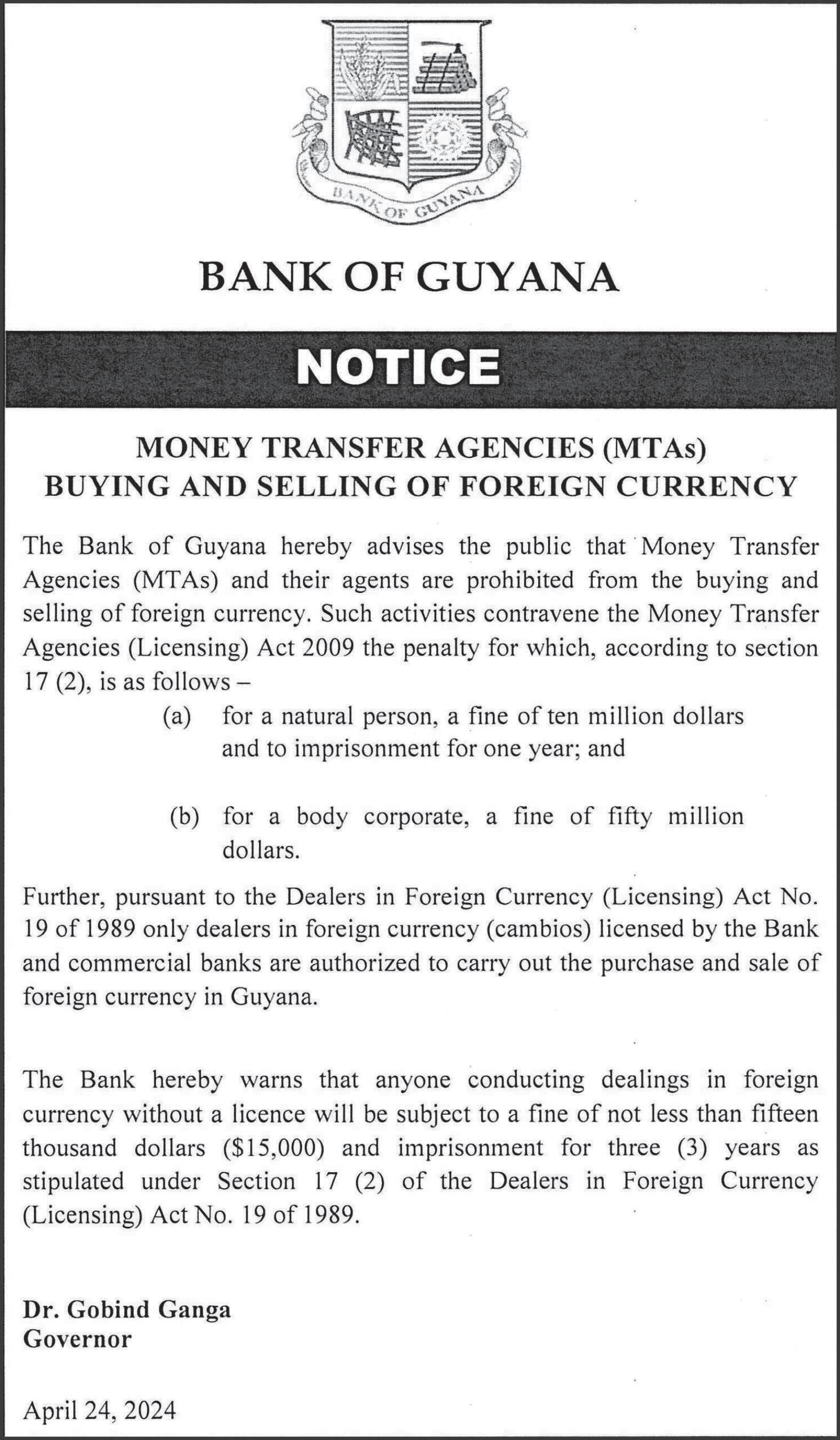



EVERY year, Earth Day is commemorated on April 22 under the auspices of the United Nations. Modern man is now gradually rediscovering that life, including human life, is impossible without the soil and earth. Accordingly, in all the ancient religions, the earth was deified. In ancient Rome and Greece, there were special temples or altars for Mother Earth, and the entire population, not only the agricultural sections, paid worship. Mother Earth is a main deity in the Hindu religion; Hindus obey her every day.
The caption we have used for this article is borrowed from the “Save the Soil” movement founded by Sadhguru, the famous international spiritual teacher. The themes and prescriptions of Earth Day and the Save the Soil Movement coincide, and the UN Convention to Combat Desertification (UNCCD), UN Environment Programme (UNEP), The International Union for the Conservation of Nature (IUCN) and The World Food Programme (WFP) have all accorded their support to the movement. Sadhguru has travelled on his motorcycle to nearly 100 countries, where he met leaders and heads of state who have all committed themselves to saving the soil.
Last year, he visited Guyana and met President Dr Irfaan Ali when 100 square kilometres of land was pledged to restore and safeguard agricultural land. As a result of this visit, a Save the Soil mural was created by three young Guyanese artists - Sadia Vasquez and Bevan and Eldon Allicock - and erected in the National Park.
The main causes of soil degradation are erosion, urbanisation, deforestation and unsustainable management practices. Each of these could be explained at greater length, but we will focus on unsustainable management practices.
When crops are grown on the soil without allowing the
soil to recuperate, the nutrients disappear from the soil, or when the soil is ploughed from crop to crop with agricultural machines, the microbial diversity and bacteria diminish or disappear, and the soil becomes infertile. The “dust bowl” in the American Midwest, as described in the novel “Grapes of Wrath” or the hills of Haiti, are examples of land misuse.
The endemic food shortage in Haiti is due to the mismanaging of their soil for nearly two centuries.
Human beings could save the soil and prevent soil degradation. The best way is to allow leaves, animals, and other biological waste to return to the earth, and this would include crop production waste, terracing to limit soil loss and using vegetative buffers which work as filters around surface water.
Some fertilisers will still be necessary in modern farming owing to the insensitive and ignorant destruction of the soil which had already occurred, and it is recommended that fertiliser be applied in certain periods to prevent storm run-off and such fertilisers should not have a high phosphorus or nitrogen content.
This year, 2024, the theme of Earth Day was
break down into microplastics, they release toxic chemicals into food and water sources, presenting a grave threat to human health.
Today, plastics are pervasive in ecosystems, from urban drains to pristine environments. For example, they become entangled with the root systems of mangroves, impairing their ability to stabilise shorelines and act as a sea defence or to provide a habitat for various species of fish and other marine life and birds. Marine animals, like turtles, mistake plastic wastes for food and ingest them, leading to internal injuries, blockages, starvation and death. This contamination extends to the human food chain when fisherfolk unwittingly supply contaminated fish to society. On the Guyana coast, plastic bottles and other plastic waste regularly clog up the kokers, impede drainage and cause mosquito breeding puddles to develop.
Plastics provide such a cheap and useful item of normal human existence that it is unlikely that the pre-plastic era would ever return. However, some damage control could be effectuated if there are regular community clean-up campaigns to bring about a clean environment for

“Planet versus Plastics” and though it does not ignore the other factors damaging or destroying the soil and earth, it focuses on plastics. When plastics were first introduced, they were regarded as an environmental solution. But soon, their damaging effects on the environment, biodiversity and human health came to the fore. When they
all: reducing the use of single-use plastics, properly disposing of plastic waste, avoiding buying goods with plastic wrappings when there are alternatives, avoiding the use of disposable plastic food containers when substitutes such as cardboard could be used; and use baskets or cloth bags when shopping.
FROM PAGE VI
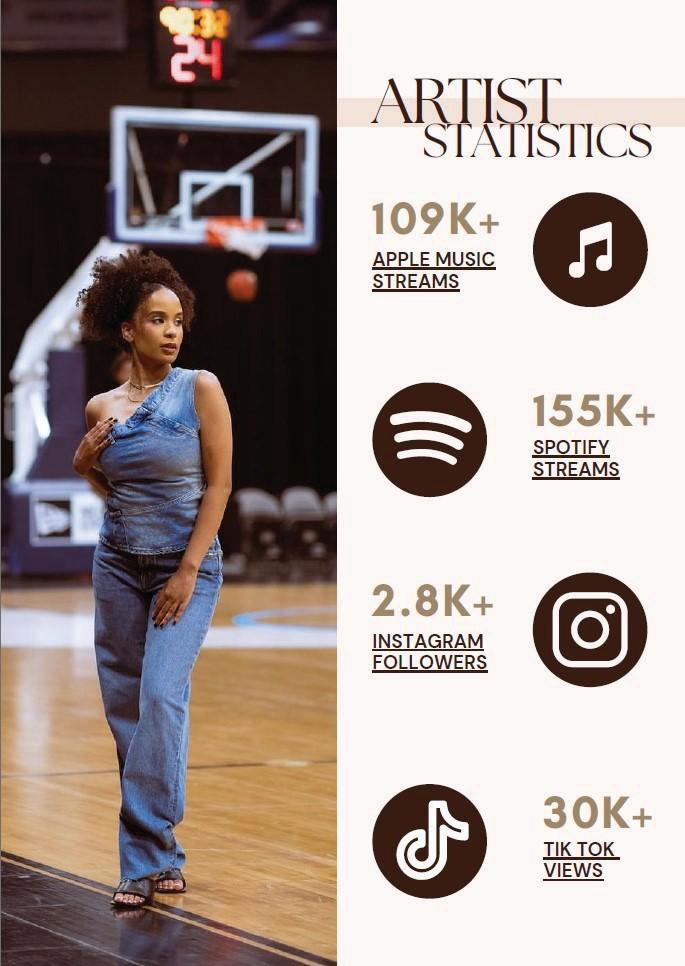

places.
“I had egg ball with sour for the first time and it was good. The food here is different, the people are equally interesting and I like the heat. It is a lovely place that showcases nature as it should be,” she said.
Jasmine has penned and voiced 10 songs and is working to produce another album this year in Canada. Having studied music for 15 years,
she has immersed herself in the field and hopes to do even more recording.
She explained that she is a performer in her country, where she sings at live concerts and festivals and as a child, she wanted to be involved in music since it consumed every aspect of her life as an individual.
Jasmine stated that she is also a songwriter who is into love and heartbreak songs,
which relate to ‘brown girls’ as a mixed-race person. She wants to inspire others through her music.
“I like the energy of the people in Guyana. The foods are delicious, every bite is meant to be savored and it is very refreshing to be here. I like it a lot and I would be back to network and do live concerts; I want to bring my music here too,” she said.

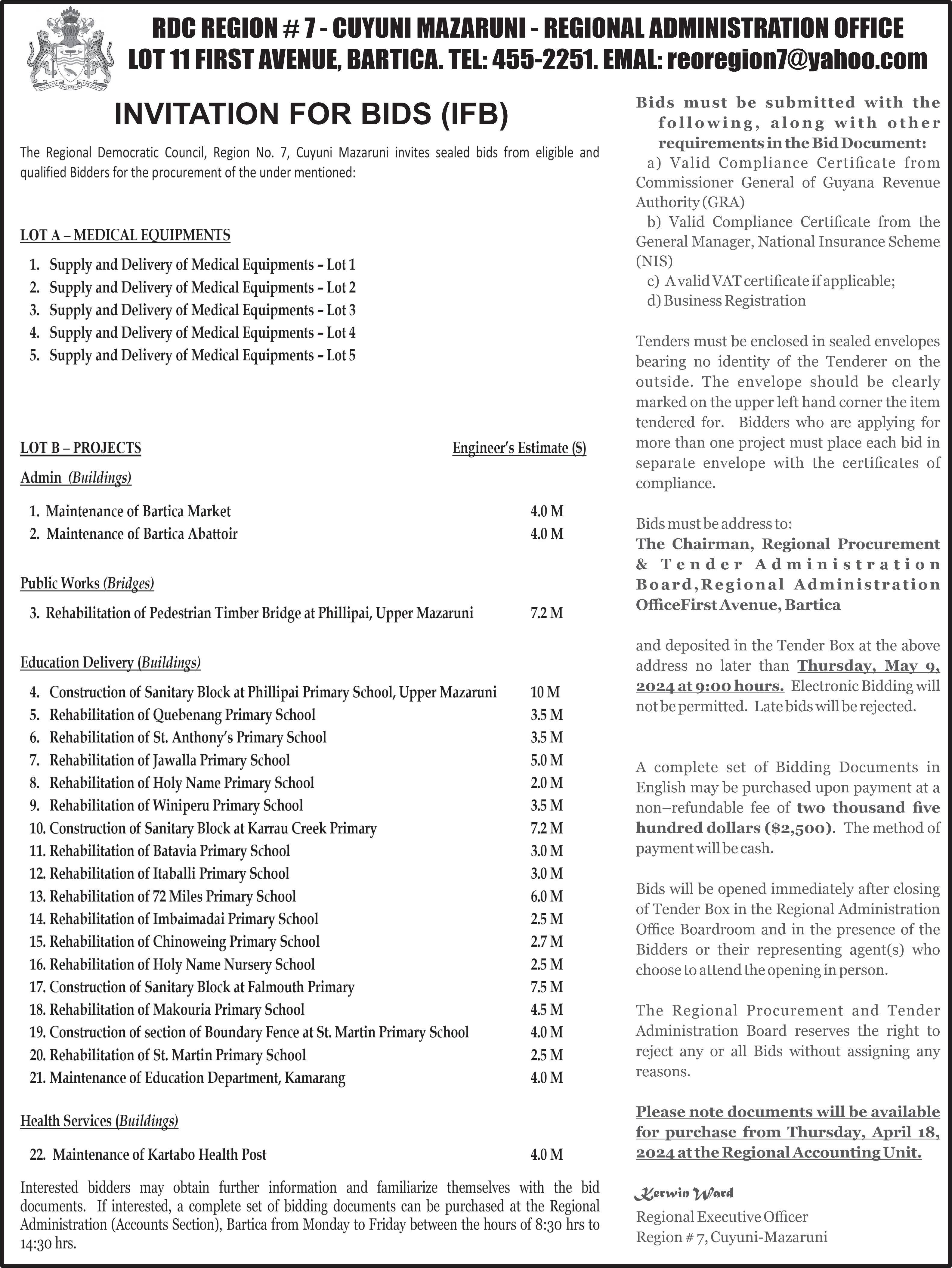
FROM PAGE X
because of the problem.”
Although battling many demons of her own, Maureen made it her duty to care for her children. After leaving her husband, Maureen continued to raise her children as a single mother, working various jobs. As she shared, “Today,
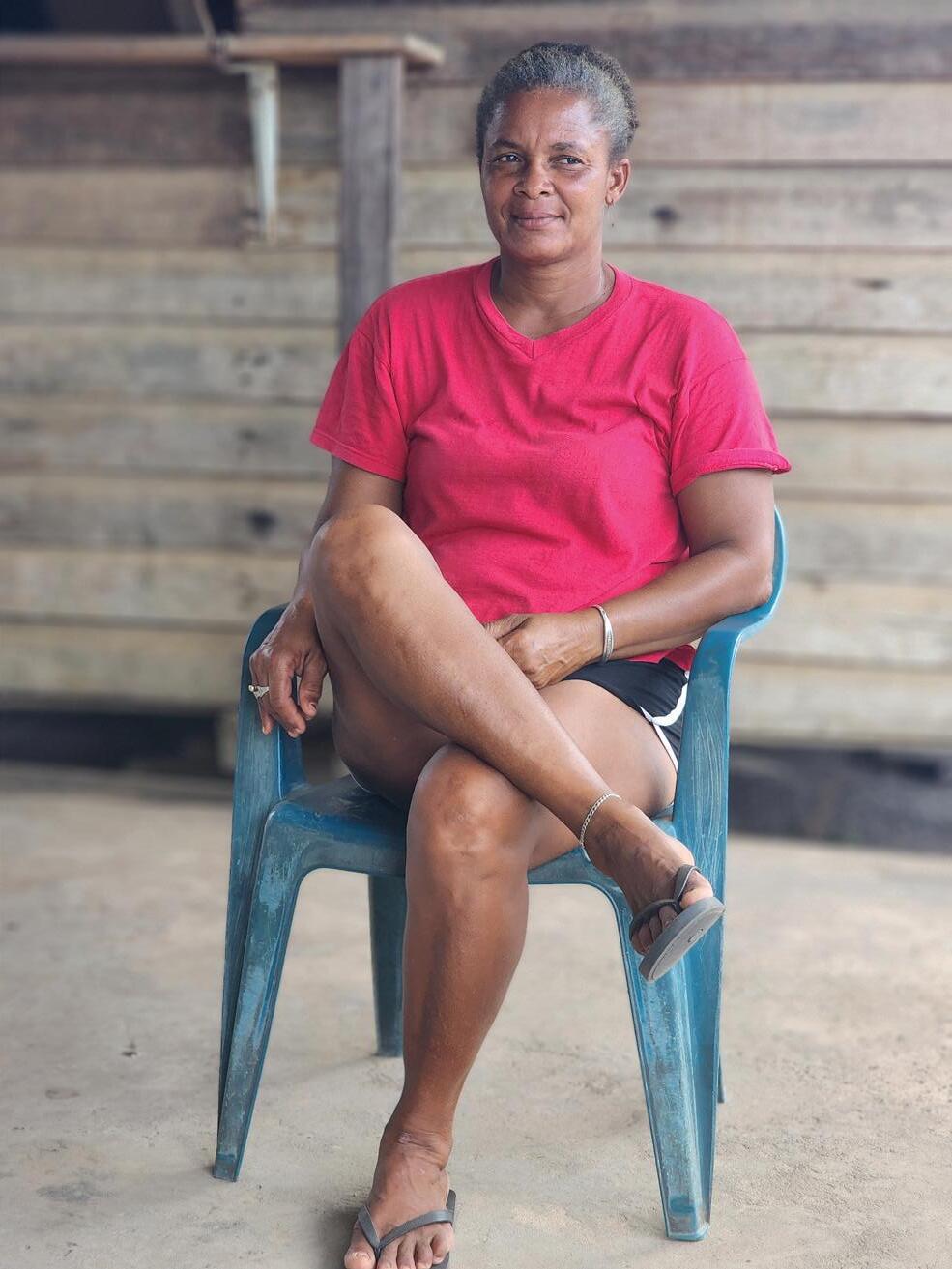
two of them reside in America while one lives with her in Madewini. She shared that her relationship with her adult children is not the best, but she is proud of them. “Now my children have grown, I tried, before they grew up, to send two of them to America with a stepmother, and these two are brother and sister, and now my two children, just like this, they’re not there for me anymore. I try my best, you know, as a single parent.”
These days, Maureen’s life is easy-going and peaceful. She owns a shop in Madewini and spends her days with her grandchildren and tending to her home. With a life filled with as many adversities as hers, Maureen says she is just happy to be simply living. “I’m just living. I’m going to live. I can’t say too much because it might make me cry. I’m just living. Trying to be happy, and comfortable, I have a friend. Sometimes we’re good, sometimes we’re not good. So, I’m just living.”



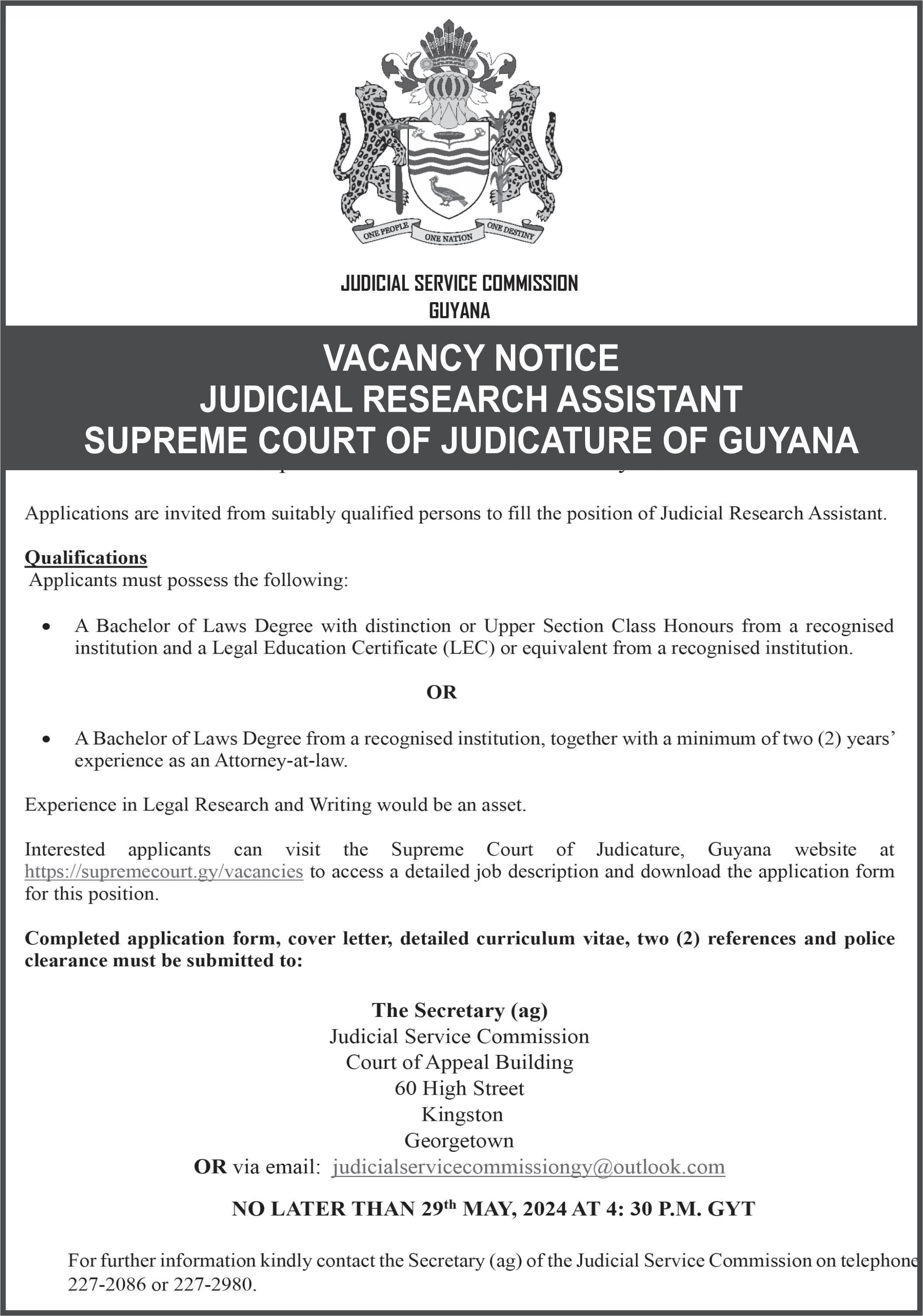
READING about grief and experiencing it at a maximum value are two different experiences. I’ve realised that grief was familiar because I’ve felt that feeling many times in the past. From failed friendships to not receiving a grade I wanted—I’ve experienced grief in some way or another before. I lost my grandmother two years ago. That experience completely changed my outlook on grief and the stages that come with it. That experience was magnified, and looking back, I can visibly see the stages I’ve endured. Today, I am happy to say that I’ve finally accepted the reality of her death. She is no longer here, and I am progressing through life with that in mind. Two years ago, that reality was completely different for me.
I wanted to share this personal journey to highlight the importance of growth through grief. It is possible to be okay again after a loss. It may seem impossible at first, but I want you to understand that grief is a natural response to loss, just as how happiness or joy are natural responses to great gain. In my University studies, I learned about the five stages of grief that were posited by Elizabeth Kubler- Ross. She highlighted denial, anger, bargaining, depression and acceptance as those stages.
While she listed them in this order, it does not neces-
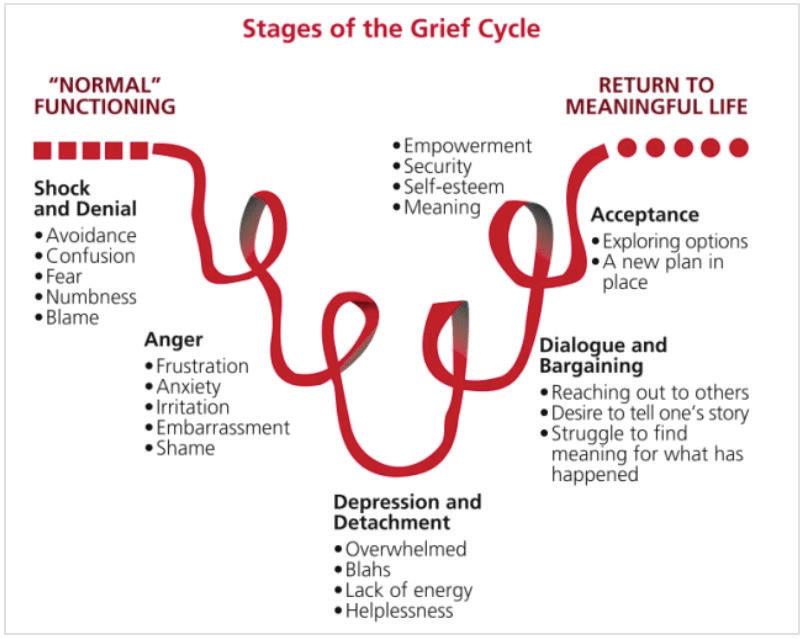
sarily mean that we may all experience them in this order. In fact, some people experience some stages together, and some may not experience specific stages altogether. These stages may sound dreadful to experience, but many people are able to overcome them within 2 years of their loss.
We’re all unique and different; the same can be said about how or what we grieve for. Grief is not only limited to death. We can grieve for divorces, the end of friendships, the loss of personal items in a fire, and the loss of a job—among many other losses. I want you to remember that grief is natural and it happens to all of us. It is our natural reaction to loss; with the right amount of support, self-care and resilience, we can overcome it. Grief is stuck with us over time, but we can find ways to be whole again, and it is possible to continue with our daily lives. One day, you’ll look back at the stages you’ve endured and finally accept the fact that this is your new reality. With that in mind, you can also reminisce on the experience and use it as a recipe for growth and resilience.


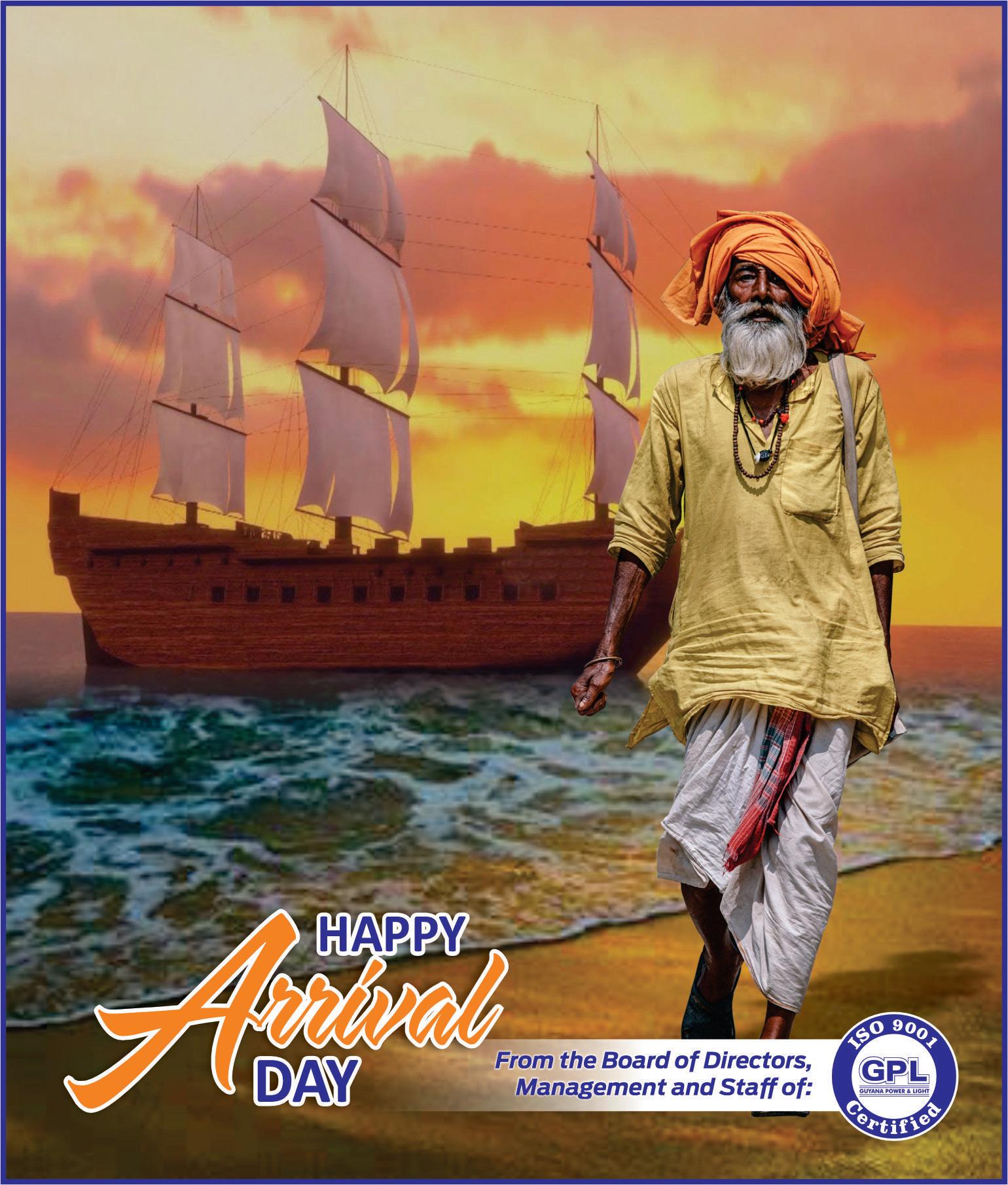








FROM PAGE II
riches his skills and knowledge, keeping him at the forefront of his field. This continuous professional development and his commitment to excellence significantly contribute to his reputation as a leader and innovator in social work, making him a standout individual in his industry.
As Sookram continues to advance in his career and expand his influence, his legacy of service and leadership will undoubtedly inspire future generations of social workers and community leaders. All of his other awards are a recognition of his past contributions and an acknowledgment of his potential to inspire and lead future initiatives that address critical social issues. Narine Dat Sookram exemplifies excellence in his field, making him truly deserving of this distinguished recognition.
Sookram was born and raised at Number 65 Village but grew up at Number 64 Village, Berbice, Guyana. He lived
right by the Number 63 Village close to the New Market Primary School, where his family had a successful business cake shop. During his childhood days, he was an active member at the Number 64 Krishna Mandir (Hindu Temple) and, at one point, was the assistant priest at 14. He attended New Market Primary School and Tagore Memorial Secondary School before migrating to Canada in 1993.
Narine is the last of seven children and the first to have completed post-secondary and post-grad education. He graduated with several degrees, including a Master of Social Work from Brescia University, a Bachelor of Social Work from the University of Manitoba, a Bachelor of Professional Arts from Athabasca University, a Bachelor of Education in Adult Education from Brock University, Social Service Worker Diploma from Mohawk College, Post-Grad in Career Development from Conestoga College and a Doctor of Social Work from Capella University.

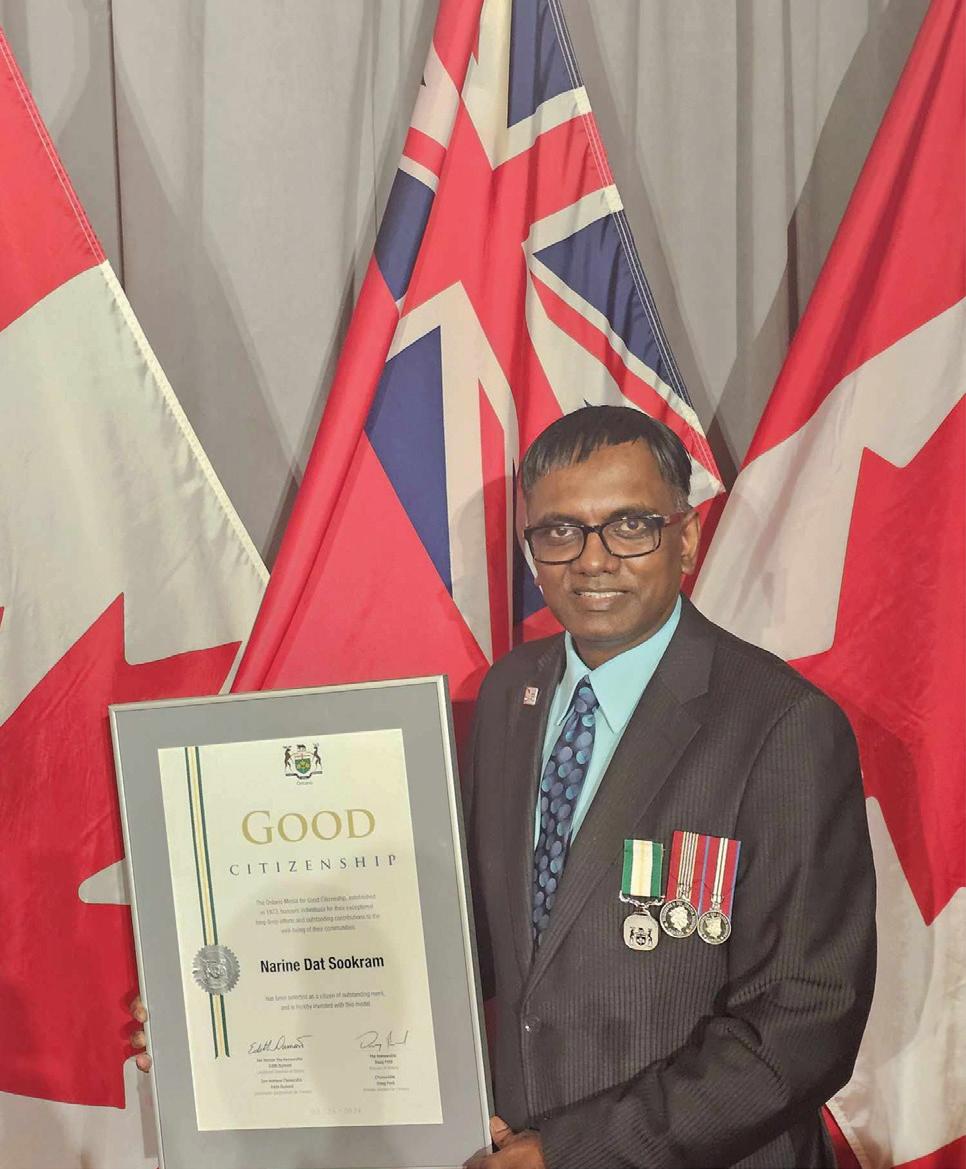

for her was never about winning. It was simply about her love for the sport. As she explained, “I never took a record of my best timings. Because I just used to run for fun. I never really looked at it as because you’re winning. And you never really had any sort of competitors to really say what would
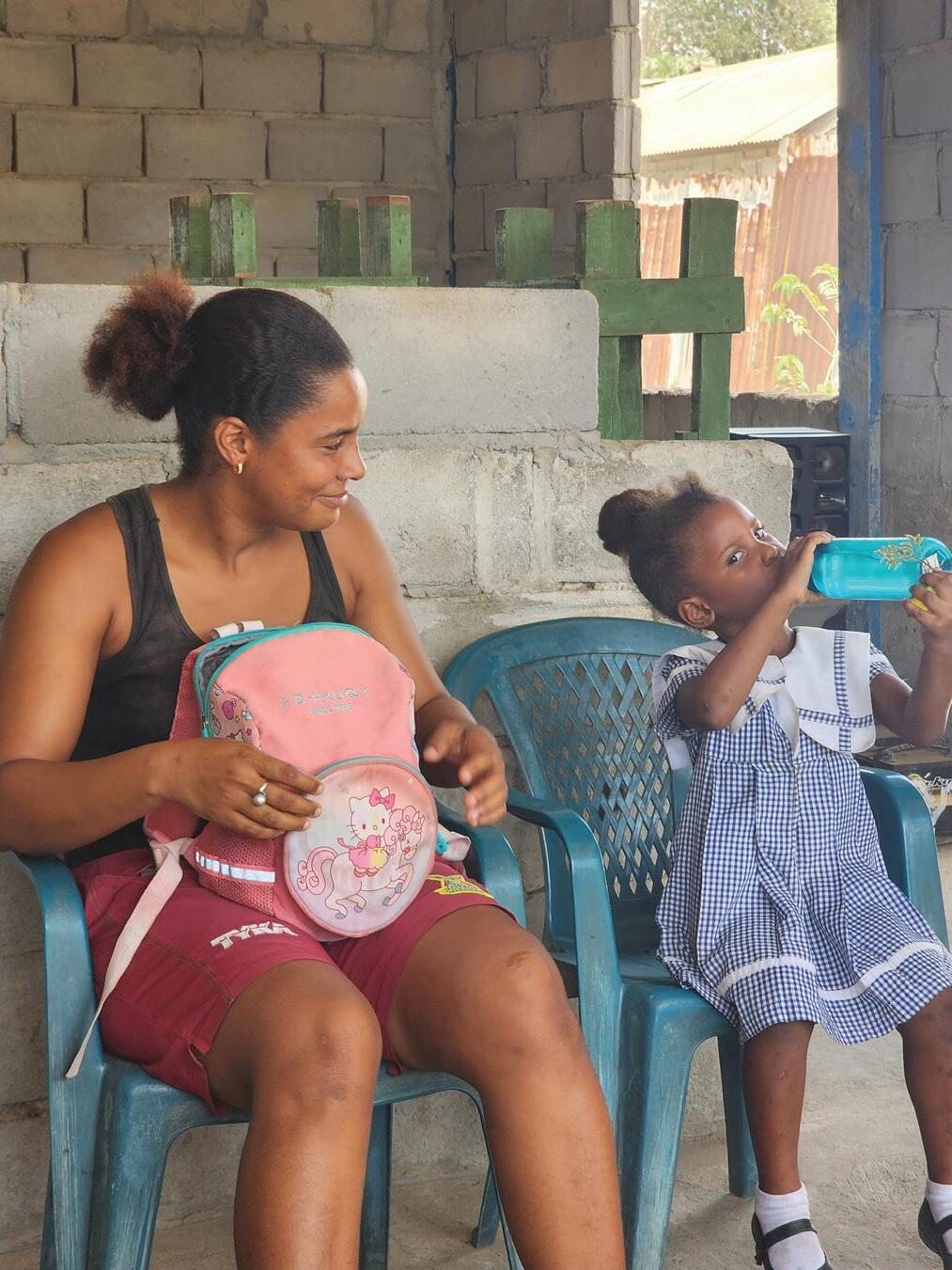
Sonya and her youngest daughter, who also loves sports.
make me worry.” Sonya shared that sports were a part of her from a very young age. She entered every sport she could and excelled at most. “Every sport I would enter. If it’s not, other than track and field, it’s netball, volleyball, table tennis, lawn
FROM PAGE VIII
living in various settings and has learned plenty from those places. However, Madewini teaches her something different.
“This place is going to teach you a lot about patience because not everything is going to come to you just like that. There’s a lot about, we would say, minimising. You would save more. Living in this village gets you to save more on a whole lot because you don’t see things to buy. In a sense, it teaches you to minimise a lot of things, even to compromise situations. You have to adapt your whole way of life. There isn’t anything special about this place other than the privacy and calmness. You come with your family, have kids, and have fun at the creeks fishing, whatever you can do.”

tennis, and badminton. Those were my games I would take part in other than my track and field at that time.”
Returning to Guyana several years ago, Sonya is now giving young sportsmen and women the support she did not get. As she explained, “I feel very proud of our Guyanese athletes. I have a little cousin; he runs for Guyana. I just try to see how I go and support him in his running. And I try to see how I get my children involved, but
they do not play track and field. They like basketball and gymnastics. Even though they’re girls, they like basketball and gymnastics. But we don’t really get much push within this community to say, well, let our children go.” Moving forward, Sonya hopes to see sports in Madewini supported. Children of the community are active and many are skilled athletes. Some of them are skilled swimmers and others are phenomenal runners. “We have got to support our children, ourselves. The children will benefit from sporting activity within this community. My children have this athletic ability within them. So they will mostly be involved in that. You will see them amongst themselves. This is their field. They will run back and forth amongst each other, racing.”
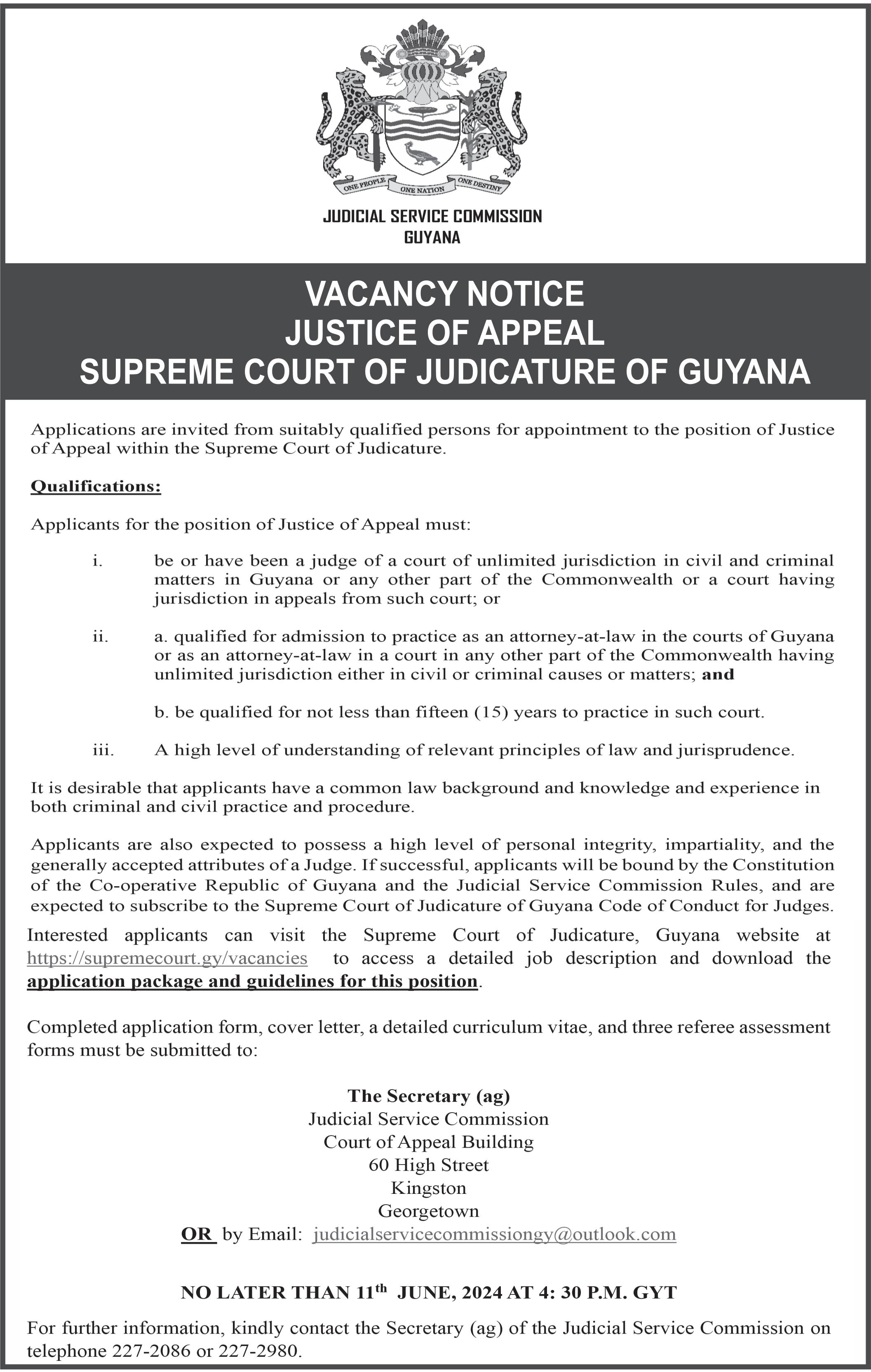












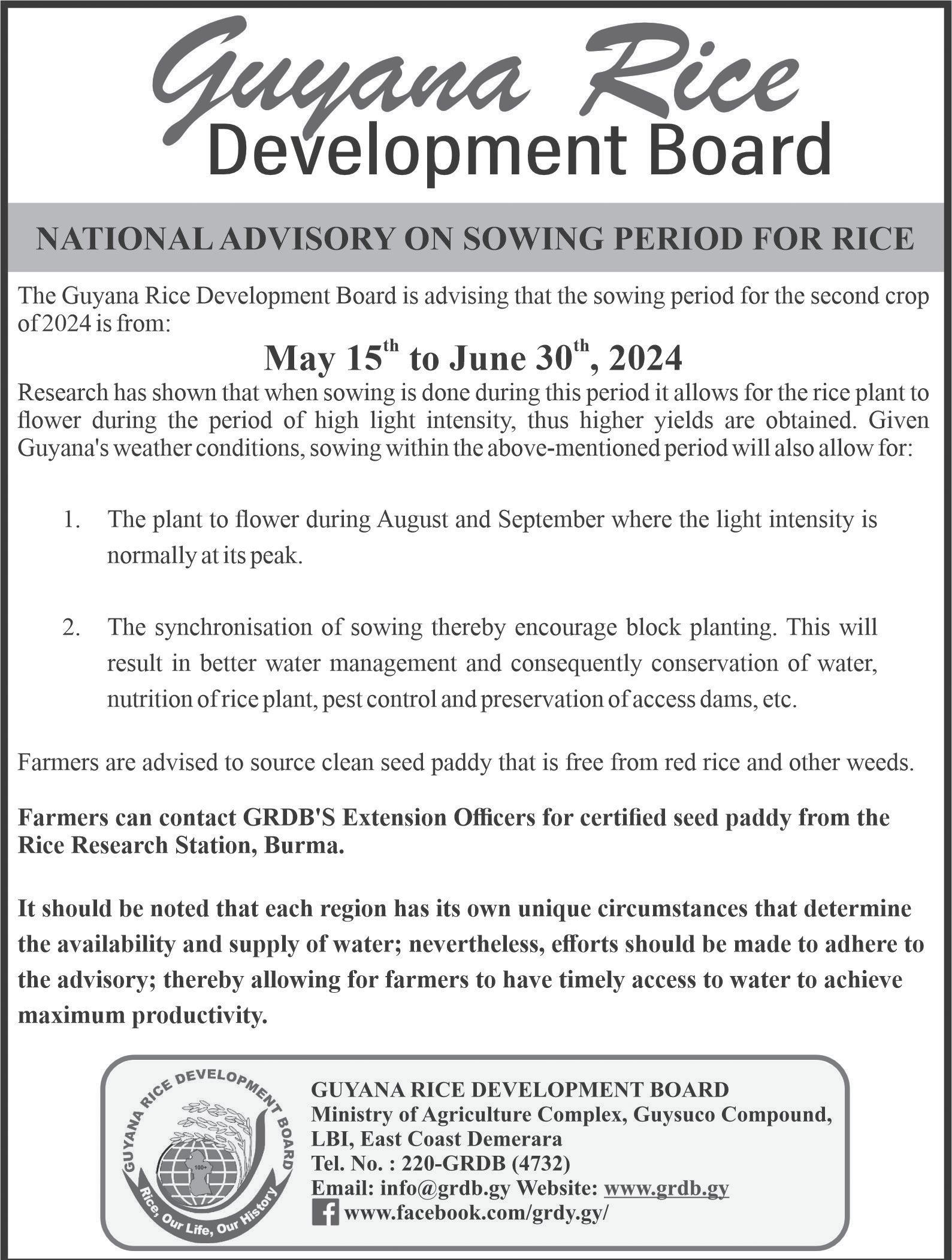

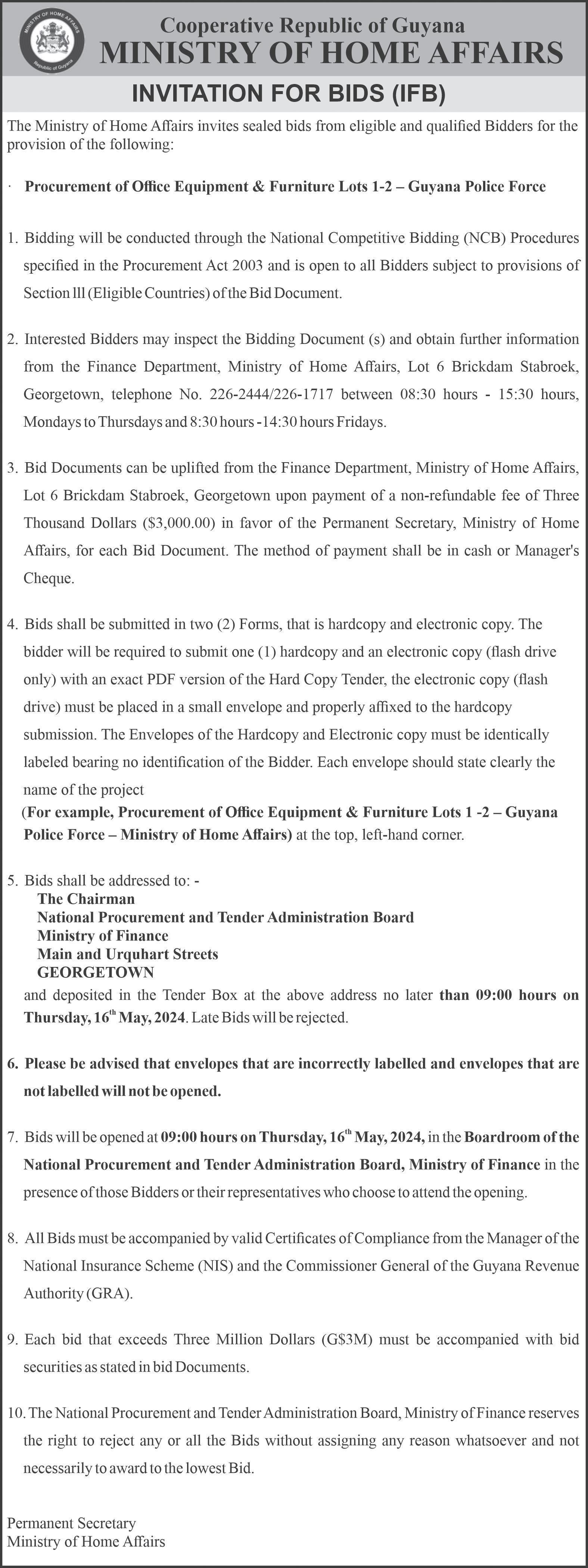
















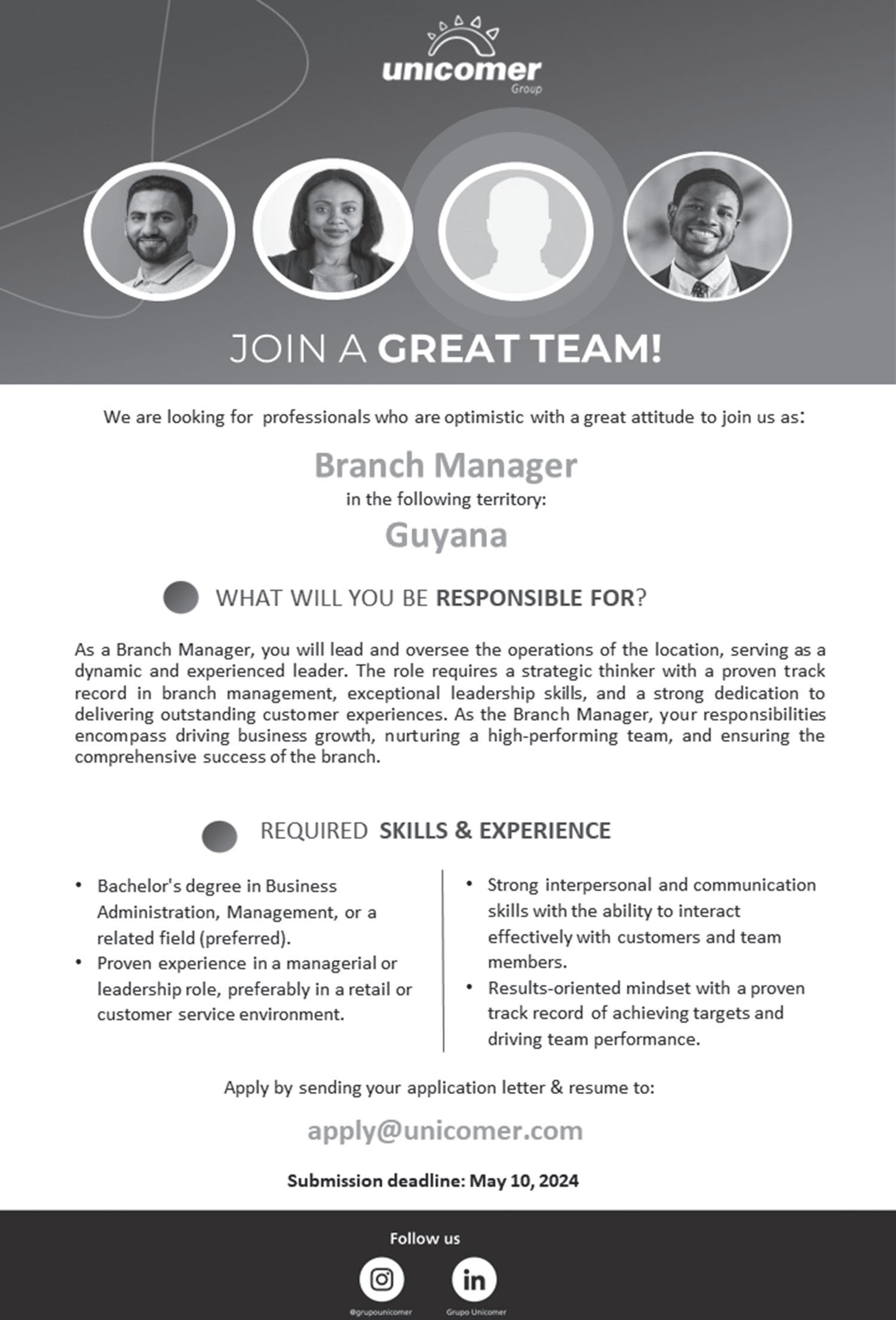


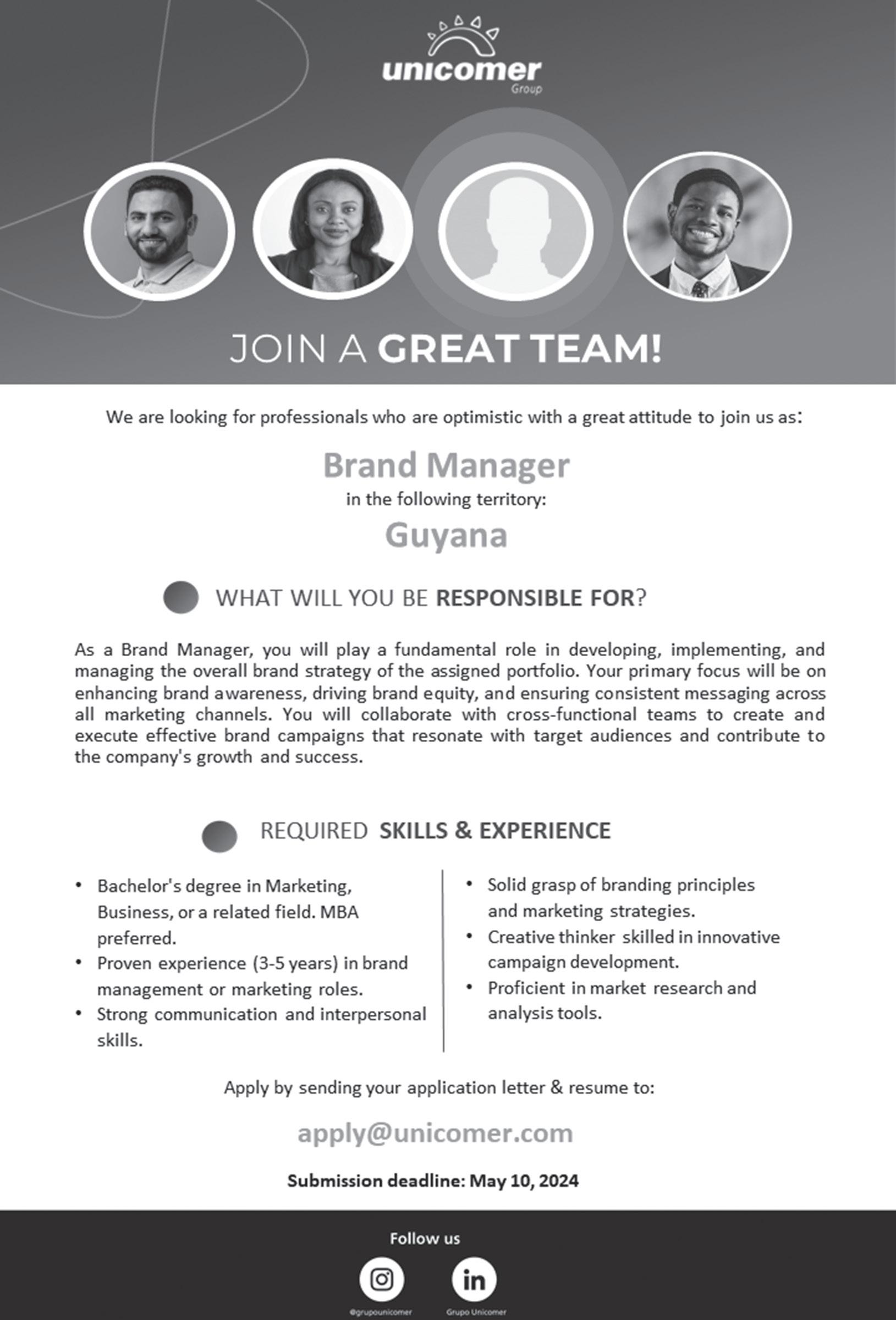



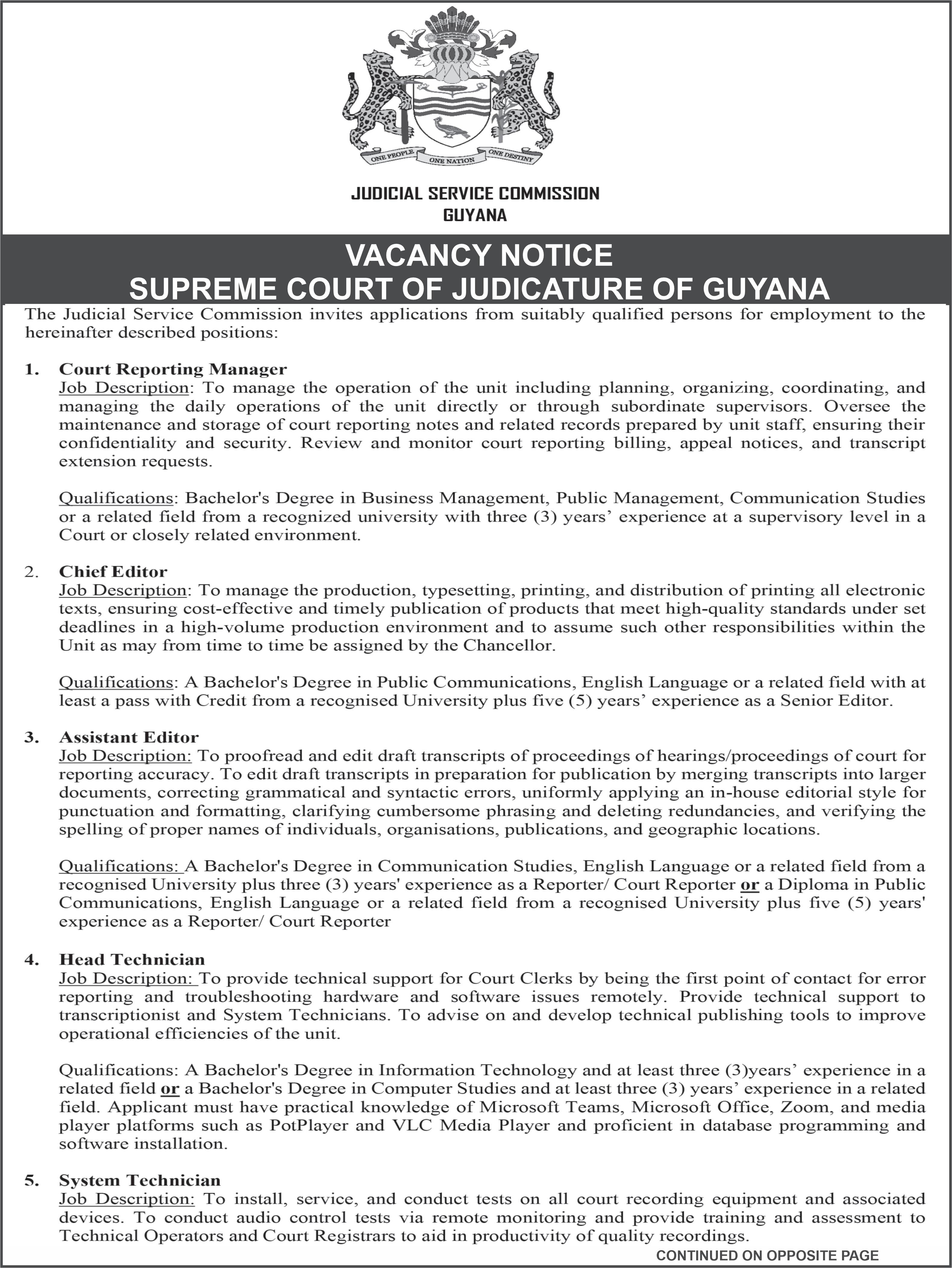


Étonne-moi Astonish me. SERGE DIAGHILEV (1872- 1929) Said to Jean Cocteau in 1912. The Journals of Jean Cocte- au, 1.
Dear Student,
Welcome dear friend.
To show your understanding and visualising of a text based on classifications, you

draw a tree diagramme of the information. Text classification, tagging or categorisation often require sorting information into groups or categories with headings based on text content. When you understand relations between parts of a text, it enables you to easily see its main points and the relations between them. Your resulting diagramme should show broad categories broken down into finer and finer levels of detail. Be wise.
Love you.
Format of letter of apology or excuse
Notes: A personal letter is written to someone you know well or want to get to know better. Its purpose is to tell about things you are interested in or concerned about. They are usually written in a familiar (casual) or functional (informal) language style, depending upon how well you know the reader.
There are several kinds of personal letters that you will have occasion to use now and later in your life. Some of these are:
● The friendly letter which is largely used to share events and experiences.
● The personal invitation letter which is used to invite the reader to go somewhere or do something at a particular time and place.
● The personal thank-you letter which expresses appreciation for something that the writer has done for some person, or for the person’s gift of kindness.
● The apology or excuse letter which may be a personal letter that is used to explain why the writer was unable to do something he or she had agreed to do.
When you are writing a personal apology or excuse letter, follow the steps below:
1. Start by clearly expressing regret for not being able to do what you had agreed to do. Express empathy for any harm caused.
2. Accept responsibility for what happened. Explain the reason(s) and, if necessary, apologise.
3. If appropriate, express the hope that the reader will understand and forgive you.
4. Offer a solution or plan to rectify the situation if possible.
5. End with a personal, friendly message for the reader.
6. Use a formal closing, such as “Sincerely” or “Yours faithfully,” followed by your name.
A personal letter of apology or excuse:
Your address Date
Dear Genevieve,
Here I am with my leg in a cast feeling miserable and mad at the same time. Yesterday while I was playing football on the grass patch behind our house, my foot got into a cow foot hole, I fell and fractured two small bones in my right foot.
The doctors at the public hospital put a cast on my whole leg, so I can’t go about much for a few weeks. This means I can’t come up to your East Coast home to help sort the barrels. I’m sorry about this. I had looked forward to seeing the food items sent for the upcoming family reunion. You know I love to help prepare interesting dishes.
Mom says I should go anyway and stay out in the patio to scan the list of ingredients to help get the buffet service menu coordinated, but I just can’t. I’d be too out-of-place. I’m sorry about not coming, but I know you’ll understand.
Maybe you can get down here afterward in the next few weeks and autograph my cast. Anyway, have fun catering next Saturday to the funny picky eaters in our fine family. Don’t worry about me. Just concentrate and mind the salt!
Your dear cousin, Sandra
This personal letter of apology or excuse tells about things the writer is interested in or concerned about. Note these points:
● Its clear, simple language.
● Its five required parts and one optional part. The five include a heading, greeting, body, closing, and signature. There is also an optional postscript a writer may decide to include.
Nearest in meaning to the original sentence
Note: A sentence that is nearest in meaning is one that has the same or very close meaning to another (original) sentence in a language. Our language is English.
Each sentence in this section is followed by four sentences, A, B, C, D. Choose the sentence nearest in meaning to the original sentence. Read all four sentences before you choose your answer.
1. Much is being done to develop tourism in our country by providing good hotel accommodation and facilities.
(A) It is important to provide good hotel accommodation and facilities for tourists.
(B) Good hotel accommodation and facilities are crucial if we want to develop tourism.
(C) We are doing a great deal to boost tourism by providing good hotel accommodation and facilities.
(D) If we do not provide good hotel accommodation and facilities, tourists will not come to our country.
2. The bright colours of the bird distinguished it from the others flying across the pale sky.
(A) The bright colours of the bird contrasted with the pale sky while it was flying.
(B) The pale sky made the birds noticeable while flying as they had bright colours.
(C) The pale sky made the birds distinguished, particularly the one with the bright colours.
(D) The bright colours against the pale sky made the bird stand out among those flying by.

THE Ministry of Health has prepared to extract about 150,000 teeth from the population this year and will use at least 150,000 capsules of dental anaesthetic in the process. The use of this drug is relatively safe with few complications resulting. However, the use of local anaesthetics, commonly referred to as “cocaine” is not without hazard, and we must all be aware of the possibility of untoward reactions.
Patients must inform their dentist of any history of anaesthetic experiences and whether they have shown any unusual reactions to drugs or allergies. The dentist should know any specific physical condition that may require support or treatment, any disease for which the patient is or has been under the care of a physician, and the type of treatment, particularly drugs, currently being prescribed.
Most reactions occurring after the injection are potentiated by the anxiety that accompanies the dental appointment, and stress is the major problem to be avoided. Other conditions that may precipitate reactions to local anaesthetic are the following:
(1) Low blood sugar levels resulting from fasting before the dental appointment. This is probably the foremost factor in fainting, so the patient must have had a regular meal. People who skip breakfast are prime candidates for fainting.
(2) Extremes in temperature. Heat exhaustion will exacerbate reactions. (3) Any debilitating disease. Disease is a prime agent that reduces the ability to respond to stress. (4) Pregnancy. This patient is sensitised, much like the allergic type. She has an increased blood level of steroids and needs careful handling.
Studies show that two to three out of every hundred members of the public will fall into the category of problem management cases. Most of these individuals have special requirements, and I will examine some of them.
Patients with cardiovascular (heart and blood vessels) diseases will probably be on special medications such as Reserpinr or Serpasil, digitalis derivatives (Digoxin), diuretics (Lasix), and tranquilisers (Valium). All these drugs may interact with the anaesthetic used when an extraction is done.
Respiratory diseases, which include emphysema and asthma, cause limitations of the oxygenation mechanism. Since fear results in increased respiration and dental chair apprehension may cause a deficit.
Patients with allergic diseases often manifest with a history of hay fever, asthma, angioedema, contact dermatitis (“ mad blood”), etc. There will often be a familial history of sensitivity. Atopic types, in extreme cases, show a reaction to the offending antigen (the anaesthetic) and may develop severe anaphylaxis and die from the injection of small amounts of the injection.
Many people take anti-coagulant therapy for stroke prevention and do not know. When it takes more than 10 minutes for a wound to stop bleeding, or if a woman menstruates more than six days, there is a probability of that person having a blood clotting problem.
Finally, individuals receiving steroid therapy do not respond well to stress. Those being treated for hyperthyroidism may have to be sedated. Uncontrolled diabetics should never have dental treatment or healing, and post-operative infection will be a problem.
